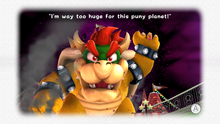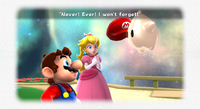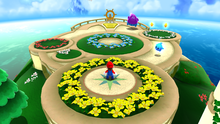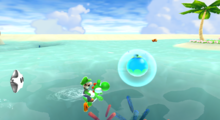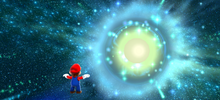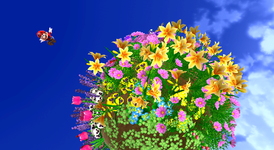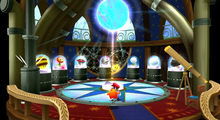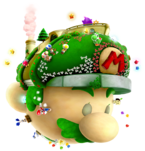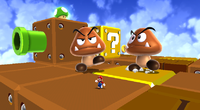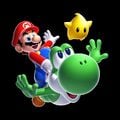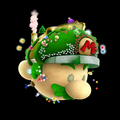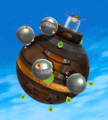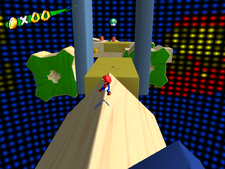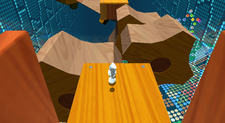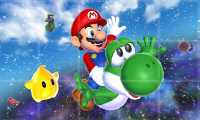Super Mario Galaxy 2: Difference between revisions
Nintendo101 (talk | contribs) m (→Starship Mario) |
m (Text replacement - "Banzai Bill" to "Banzai Bill") |
||
| Line 1,154: | Line 1,154: | ||
|{{chart icon|new}} | |{{chart icon|new}} | ||
|- | |- | ||
|data-sort-value=Ban style="background:white"|[[File:BanzaiBillSMG.png|100x100px]]<br>[[Banzai Bill]] | |data-sort-value=Ban style="background:white"|[[File:BanzaiBillSMG.png|100x100px]]<br>[[Bomber Bill|Banzai Bill]] | ||
|align=left|Slow-moving missiles. Their line of trajectory is fixed in one direction, and they slowly rotate as they move. | |align=left|Slow-moving missiles. Their line of trajectory is fixed in one direction, and they slowly rotate as they move. | ||
|data-sort-value=01|[[Sky Station Galaxy]] | |data-sort-value=01|[[Sky Station Galaxy]] | ||
| Line 1,813: | Line 1,813: | ||
|- | |- | ||
|style="background:white"|[[File:SMG2 Banzai Bill Blaster.png|100x100px]]<br>[[Banzai Bill Cannon]] | |style="background:white"|[[File:SMG2 Banzai Bill Blaster.png|100x100px]]<br>[[Banzai Bill Cannon]] | ||
|align=left|Giant cannons that fire [[Banzai Bill]]s. | |align=left|Giant cannons that fire [[Bomber Bill|Banzai Bill]]s. | ||
|[[Sky Station Galaxy]] | |[[Sky Station Galaxy]] | ||
|[[Bowser's Galaxy Generator]] | |[[Bowser's Galaxy Generator]] | ||
Revision as of 15:32, October 16, 2024
| Super Mario Galaxy 2 | |||||||||||||||||
|---|---|---|---|---|---|---|---|---|---|---|---|---|---|---|---|---|---|
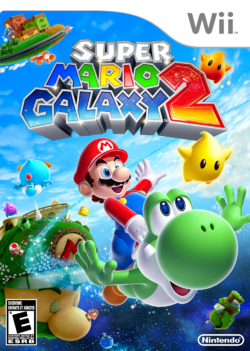 For alternate box art, see the game's gallery. | |||||||||||||||||
| Developer | Nintendo EAD Tokyo | ||||||||||||||||
| Publisher | Nintendo | ||||||||||||||||
| Platform(s) | Wii, Wii U | ||||||||||||||||
| Release date | Wii (original release): Wii (Nintendo Selects): Wii U (digital download): | ||||||||||||||||
| Language(s) | English (United States) French (France) French (Canada) German Spanish (Spain) Spanish (Latin America) Italian Japanese Traditional Chinese Korean | ||||||||||||||||
| Genre | Platformer | ||||||||||||||||
| Rating(s) |
| ||||||||||||||||
| Mode(s) | Single player, two-player cooperative | ||||||||||||||||
| Format | Wii: Wii U: | ||||||||||||||||
| Input | Wii: Wii U:
| ||||||||||||||||
| Serial code(s) | |||||||||||||||||
- “Launch into a new adventure!”
- —Save data description
Super Mario Galaxy 2 is a 3D action platform game released for the Wii on May 22, 2010. It is the sequel to the 2007 game Super Mario Galaxy, the thirteenth entry in the Super Mario series,[3] the fourth 3D platformer, and the only 3D platformer in the Super Mario series to be released on the same console as its predecessor. The sequel retains many elements from its predecessor, such as the adventure being in outer space, the element of gravity, items such as the Bee Mushroom and Spring Mushroom, and recurring objects such as Launch Stars and Sling Stars. However, the game introduces new elements as well, such as the utilization of Yoshi, new power-ups like the Cloud Flower, and the use of a guide within the game for beginner players. All releases of the game except for the American version included a beginner's DVD to help players understand the controls and items if they had not played Super Mario Galaxy. In North America, help for beginners was found on the official website as well as on the Nintendo Channel.
Super Mario Galaxy 2 was also the first Wii title to be digitally re-released on the Wii U's Nintendo eShop service.
Story
From the instruction booklet
Shining stardust falls on the Mushroom Kingdom once every hundred years. That time had come again...
- Dear Mario,
- Would you like to share some cake while we watch the shooting stars? Meet me at the castle!
- Peach
Mario ran through the field with stars falling around him. Suddenly, he noticed a strange light in the grass. As he peered cautiously through the reeds, he saw a small, lost Luma. With the baby Luma tucked safely under his cap, Mario rushed on to the castle. But when he got there, something unexpected was waiting for him…
Super Mario Galaxy 2 is "another story of stardust".[4] The game begins at the time of the Star Festival, which only happens every 100 years. Princess Peach invites Mario to share some cake while watching the shooting stars. On his way to Peach's Castle, Mario finds a lost Baby Luma, who seems to like Mario and jumps into his hat, granting him spin power. Near the castle, Mario discovers it under attack by Bowser, now gigantic thanks to the Power Stars, who kidnaps Peach and takes her to the center of the universe. In response, Lumas who crashed near the castle offer to aid Mario to chase Bowser by transforming into a Launch Star and launching Mario to space.
After collecting a Power Star, Mario arrives on a planet-like object, where he meets Lubba, who tells him that his crew and their spaceship were attacked by Bowser. Realizing both him and Mario need each others' help to collect the stolen Power Stars and rescue Peach, he uses the Power Star to fix his ship and transform it into Starship Mario, which is used to travel through space and find more Power Stars. During his travels, Mario has to deal with Bowser's forces, including Bowser Jr. and Super Bowser himself.
Finally, Mario and friends locate Bowser's Galaxy Generator, where Bowser is fought for the final time. After Bowser's defeat, his empire becomes undone, and Peach is saved. A comet which was caught by Bowser's fortress is also freed and is revealed to be the Comet Observatory. Rosalina then appears, happy to see that Baby Luma is safe. Baby Luma, overjoyed that he's reunited with his "mama", heads back to his home, and takes Mario's cap as a souvenir, much to Mario's surprise. After the Comet Observatory leaves, Mario and Peach return to their own home using the Starship Mario. Along the way, Bowser is shown in a tiny form near Peach's Castle.

If the player collects the first 120 Power Stars and battles Bowser again in his fortress, an extra scene is shown after the credits, revealing Rosalina and her Lumas in the Comet Observatory's Library. She has finished reading a story to them (possibly the events of the game itself) and plans on telling the Lumas a new story about the Green Stars. A new feature is then unlocked in which all the galaxies are visited by green Prankster Comets. From there, the player must hunt down all the Green Stars. When they are all collected (adding up to 240 Power Stars), the Grandmaster Galaxy is opened in World S. It houses the last two Power Stars, and when the last one is reached, Rosalina congratulates the player and appears on Starship Mario.
Gameplay elements
The gameplay is similar to Super Mario Galaxy, with a focus on platforming based on and around 3D planets of varying sizes and with many different types of surfaces. Power-ups, such as the Bee Mushroom, Boo Mushroom, Spring Mushroom, and Fire Flower make a return, along with new ones such as the Rock Mushroom and the Cloud Flower, as well as various enemies and Airships. Launch Stars reappear for interplanetary navigation, along with a Luma and Mario's spin action. Additionally, the concept of "dark matter" appears as the medium of which Cosmic Clones are composed, and as a portal through which Airships emerge. 2-D stages featured in Super Mario Galaxy are also included in Super Mario Galaxy 2, introducing many new features. The game has only three file slots to use, unlike the six files in the preceding game; also, files can no longer be copied.
Mario is controlled with the analog stick and can jump with the ![]() . The
. The ![]() works just as the
works just as the ![]() trigger did in Super Mario 64. The player uses it to make Mario crouch, do Somersaults, and do Long Jumps. The
trigger did in Super Mario 64. The player uses it to make Mario crouch, do Somersaults, and do Long Jumps. The ![]() centers the camera behind Mario, while the
centers the camera behind Mario, while the ![]() can adjust the camera angle manually. By pressing the upper part of the
can adjust the camera angle manually. By pressing the upper part of the ![]() , the player can enter a first-person perspective.
, the player can enter a first-person perspective.
The game also uses the motion sensors in the Wii Remote. The pointer of the Remote appears as the Star Pointer on the screen. The Star Pointer is used to perform a variety of actions, such as using Pull Stars, manipulating Sling Pods, and collecting Star Bits. Shaking the Wii Remote or Nunchuk makes Mario perform a spin.
One of the more notable additions in Super Mario Galaxy 2 is the inclusion of Yoshi. When Mario finds a Yoshi egg, he can crack it to release and use Yoshi. Yoshi changes colors when eating either a Dash Pepper, Blimp Fruit or Bulb Berry; a Dash Yoshi darts at rapid speeds, a Blimp Yoshi inflates and floats upwards, and a Bulb Yoshi lights up and shows hidden paths for a certain amount of time, respectively. When utilizing Yoshi, the player's Wii Remote cursor turns into a red sphere that detects targets for Yoshi's tongue. Using the cursor allows Yoshi to swallow enemies and swing from special flowers.
Elements from older games are also included in the new game. These elements include a remix of Super Mario Bros.'s overworld theme (which is originally heard in Toy Time Galaxy from the predecessor, Super Mario Galaxy), Supermassive Galaxy, a galaxy that is reminiscent of Giant Land from Super Mario Bros. 3, a remix of the second overworld theme from Super Mario World, the Checkpoint Flag from New Super Mario Bros. Wii, Throwback Galaxy, a galaxy based on Whomp's Fortress from Super Mario 64, and a remix of the main theme and slide theme from Super Mario 64.
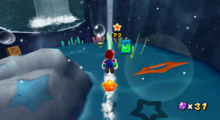
Like Super Mario Galaxy, Super Mario Galaxy 2 features a main hub. For traveling between different galaxies, Mario uses a planet shaped like his head, Starship Mario. Starship Mario can be explored, much like the Comet Observatory, although it is smaller. The game has a total of 242 stars to collect, twice the number of stars found in Super Mario Galaxy, including 120 Power Stars, 120 Green Stars and an extra 2 Power Stars in Grandmaster Galaxy.
Multiplayer from the original Super Mario Galaxy reappears, but in addition to being another star pointer, the second player is a Co-Star Luma. The second player can stun enemies and pick up Star Bits like in Super Mario Galaxy, but now they can pick up coins (including Purple Coins) and mushrooms, defeat enemies by spinning, stop the Star Ball (while player 1 is riding on it), activate checkpoints, and flip switches.

Super Mario Galaxy 2 features ways to help players during gameplay similar to the Super Guide mode seen in New Super Mario Bros. Wii. In some levels, the player may watch the Tip Network, which is a short demonstration of Mario taking some actions to progress. Another way the game offers is the Cosmic Guide mode. If the player finds a very difficult obstacle on their way, an entity known as the Cosmic Spirit asks Mario if he needs some help. Activating this mode, Mario passes automatically through the level to find the Star. The player may stop this mode by pressing the ![]() , though once the player has chosen this mode, they finish a level by getting a Bronze Star instead of one gold. The player must play through the level without the Cosmic Guide to gain a gold Star.
, though once the player has chosen this mode, they finish a level by getting a Bronze Star instead of one gold. The player must play through the level without the Cosmic Guide to gain a gold Star.
Unlike in Super Mario Galaxy, the player can now switch between playing as Mario or playing as Luigi in certain levels. If the player clears Bowser's Galaxy Generator, Luigi can be played as in any level. Like in most Super Mario games, Luigi can jump higher but has reduced traction.
Controls
| Action(s) | Input(s) | |||
|---|---|---|---|---|
| Mario and Luigi controls | ||||
| Move | ||||
| Spin, engage object, throw object, skate | Shake | |||
| Kick | Make contact with stunned enemy | |||
| Jump, speak, read, swim | ||||
| Double jump | (repeat twice) | |||
| Triple jump | (repeat thrice) | |||
| Backwards somersault | ||||
| Wall jump | ||||
| Side somersault | ||||
| Long jump | ||||
| Spin jump | Shake | |||
| Ground pound | ||||
| Homing ground pound | Shake | |||
| Grab or release pole | ||||
| Climb or slide down pole | (While grabbing pole) | |||
| Spin around pole | (While grabbing pole) | |||
| Crouch, dive underwater | ||||
| Crawl | ||||
| Sweep kick | ||||
| Move camera | ||||
| Enter first-person view | ||||
| Reset camera | ||||
| Roll the Star Ball, soar with Fluzzard | Tilt | |||
| Move leaf raft | Adjust | |||
| Yoshi controls | ||||
| Move | ||||
| Head shake | Shake | |||
| Kick | Make contact with stunned enemy | |||
| Jump, speak, read, swim | ||||
| Double jump | (repeat twice) | |||
| Side somersault | ||||
| Flutter jump | Hold | |||
| Eat, spit, grapple | ||||
| Pull | Hold | |||
| Crouch | ||||
| Crawl | ||||
| Dismount Yoshi | ||||
| Power-up controls | ||||
| Create platform in Cloud form | Shake | |||
| Roll into a boulder in Rock form | Shake | |||
| Adjust trajectory in Rock form | ||||
| Toss fireball in Fire form | Shake | |||
| Hover in Bee form | Hold | |||
| Float in Boo form | ||||
| Phase through walls in Boo form | Shake | |||
| Bounce in Spring form | ||||
| Get a speed boost in Yoshi's Dash form | ||||
| Slow Yoshi's ascent in his Blimp form | Hold | |||
| Star Pointer and Co-Star Luma controls | ||||
| Collect a Star Bit | Move Template:Chart icon over a Star Bit | |||
| Shoot a Star Bit | Template:Chart icon + | |||
| Rapidly shoot Star Bits | Template:Chart icon + hold | |||
| Enter a Pull Star (P1 only) | Template:Chart icon + hold | |||
| Fire cannon (P1 only) | Template:Chart icon + | |||
| Star spin (Template:Chart icon only) | Shake | |||
| Stop an enemy (Template:Chart icon only) | Move Template:Chart icon over an enemy + hold | |||
| Defeat an enemy (Template:Chart icon only) | Shake | |||
| Collect item or activate object (Template:Chart icon only) | Template:Chart icon + | |||
| Make a sound on P1's Wii Remote (Template:Chart icon only) |
||||
| Make a sound on P2's Wii Remote (Template:Chart icon only) |
||||
| Menu controls | ||||
| Navigate menu | Template:Chart icon | |||
| Confirm command | ||||
| Cancel command | ||||
| Zoom out | ||||
| Display HOME menu | ||||
| Display pause menu | ||||
Locations
Setting

Super Mario Galaxy 2 is set in outer space. With the exception of the prologue that is staged in the Mushroom Kingdom, all levels – referred to as "galaxies" in this game – occur on distant, off-world lands. A galaxy is a cluster of planetary objects and other celestial bodies that can be traveled between. Most of these objects have their own gravitational pull. This prevents Mario from falling off their edge and mitigates the chances of the player getting lost.[5][6] There are few walls or ceilings on the planets to obstruct Mario's path, and if he keeps moving forward in one direction, he returns to his starting position. Most planets are spherical or at least have rounded edges to complement this concept. Not all planets are structured like this: some are structured like traditional Super Mario courses and have their center of gravity below their mass.
Many galaxies take place on two-dimensional planes and Mario's movement options are restricted accordingly (i.e. when Mario is on a 2D side-scrolling plane, the player cannot tilt ![]() towards the z-axis to make him fall off the side). There are galaxies entirely on 2D planes, but also ones that feature both 2D and traditional 3D segments. They are usually restricted to specific planets and conveyed through environmental context. Many galaxies feature switches mounted into the landscape that change the entire level when interacted with. Some shift between the gravity being pulled from the floor and ceiling. Others slow down time, or shift placement when Mario spins.
towards the z-axis to make him fall off the side). There are galaxies entirely on 2D planes, but also ones that feature both 2D and traditional 3D segments. They are usually restricted to specific planets and conveyed through environmental context. Many galaxies feature switches mounted into the landscape that change the entire level when interacted with. Some shift between the gravity being pulled from the floor and ceiling. Others slow down time, or shift placement when Mario spins.
The theme of space is more subdued in Super Mario Galaxy 2 than it is in its predecessor. While there are galaxies that feature skyboxes with nebulas and stars, the most recurring backdrop is a blue sky with fluffy clouds. However, the game does convey the outer space setting in ways distinct from the first Super Mario Galaxy. As Starship Mario, the game's hub, travels through space, it passes asteroid belts, falling stars, and black holes. Lumas, star children introduced in its predecessor, appear in nearly all galaxies and on the hub. The game's thematic core is surreal and whimsical. Rather than resemble a spacecraft, the hub is a grassy planetoid shaped like Mario's head and has a wooden bow like a seafaring vessel. Gulls fly alongside the ship, as if it were on the open ocean. The whole game is framed from the perspective of an unseen narrator reading a storybook to the player, and many locations have Carrollian elements. A pair of robots have tea together in a garden on Starship Mario. Several galaxies resemble topiaries and dollhouses. Some planets look like wooden blocks, candies, clouds, and musical instruments.
According to producer Shigeru Miyamoto, the integration of 2D levels derived from a desire to make Super Mario Galaxy 2 more accessible and less daunting to players inexperienced with 3D platformers. Integration of elaborate switch elements bore from the desire to differentiate Super Mario Galaxy 2 from its predecessor similarly to how The Legend of Zelda: Majora's Mask (2000) was differentiated from The Legend of Zelda: Ocarina of Time (1998).[7] Many elements not present in the first Super Mario Galaxy informed the setting of the courses that feature them. For example, the first galaxy to feature the Spin Drill item, Spin-Dig Galaxy, visually alludes to construction sites and has enemies that tunnel through soil.[8]
Galaxies
- Main article: Galaxy
In Super Mario Galaxy 2, levels are accessed linearly via a world map. This is a departure from the proceeding 3D Super Mario games and is comparable to the 2D ones. The player accesses worlds from the Starship Mario, a small planetoid that serves as the game's hub. When Mario steps on a panel on the starship's bow, the perspective rapidly pans out to a view of the current world. Starship Mario – itself shaped like Mario's head – is a stand-in for Mario himself that can be moved between galaxies like a cursor. Galaxies are unlocked unilaterally – collecting a Power Star within one opens up paths to the nearest galaxies (with the exception of World S where each galaxy must have at least one mission completed to access the next), the final galaxy of each world is a boss galaxy that features a fight against Bowser Jr. or Bowser. Defeating them unlocks the following world. The earliest worlds have the simplest, most straightforward paths between galaxies, but the paths become more divergent with each world, enabling the player to visit galaxies in whatever order they want (see right).
Unlike proceeding games that feature worlds – like Super Mario Bros. 3 (1988) and New Super Mario Bros. (2006) – the galaxies within the worlds of Super Mario Galaxy 2 are not thematically unified. For example, World 3 contains galaxies themed around forests, snow, and haunted houses. While not all galaxies need to be completed, no numbered worlds can be skipped over to reach the end credits.
Each galaxy contains objectives called missions. Completing a mission has Mario obtaining one of the galaxy's Power Stars. One mission correlates with one Power Star. The structure of missions is closely derived from the first Super Mario Galaxy (2007). However, there are fewer dedicated missions in individual galaxies, with none having more than three. By contrast, the most robust galaxies in Super Mario Galaxy have as many as six missions. Some missions have one or more hidden Green Stars that begin to appear once the player has collected 120 normal Power Stars. Like regular Power Stars, collecting one is considered as the end of the mission. Grandmaster Galaxy is the only course in the game to lack any Green Stars. Combined, there are 242 collectible Stars in the game.
Some galaxies can only be unlocked by feeding Hungry Lumas a requested number of Star Bits. When touched, they appear on the world map and transport to the Starship Mario. There is one in every world. Hungry Lumas appear within galaxies too, but these individuals eat coins instead of Star Bits. Feeding one the requested amount causes it to transform into a planet that contains a Secret Star. Secret Star missions are otherwise unlocked by completing certain criteria. Doing so causes non-playable characters to write letters to Mario requesting his help or to challenge him in specific galaxies he has already visited at least once. The most recurring writer is The Chimp, a monkey from Fluffy Bluff Galaxy who considers Mario to be his rival.
After Mario has completed "Bowser's Big Lava Power Party" and collects three Power Stars from World 3, his brother Luigi begins to appear in some galaxies and offer to collect the Power Star for him. Selecting "yes" allows the player to control Luigi for the mission until it is completed or exited. Completing the mission as Luigi unlocks a staff ghost for the galaxy. When followed, it leads the player towards hidden items or Secret Stars. Once "Bowser's Fortified Fortress" is completed, Luigi becomes permanently accessible via a room on Starship Mario's stern and can be played as in any level.
Super Mario Galaxy 2 is the first 3D Super Mario game to include a dedicated secret world accessible only after completing the main story, similar to the Special Zone of Super Mario World (1990) or World 9 of New Super Mario Bros. Wii (2009). Called World S, this world contains several galaxies based around planets from the first Super Mario Galaxy as well as a galaxy based on The Secret of Ricco Tower mission from Super Mario Sunshine.
There are 49 galaxies in the game, 50 if Starship Mario is included. The chart below lists the galaxies in the order that they appear on the Star List. The galaxies are separated and color-coded according to the world they occur in. Each galaxy is given a brief description, an in-game screenshot, and a list of its missions. The descriptions come from the official Prima Games guide for Super Mario Galaxy 2.[9] There is a legend at the bottom of the chart that details what the symbols used in it represent.
| Galaxies | |||||||||||
|---|---|---|---|---|---|---|---|---|---|---|---|
| 01. Sky Station Galaxy Template:Chart icon×6 Template:Chart icon×9 Template:Chart icon×2 |
Missions | ||||||||||

|
Template:Chart icon Peewee Piranha's Temper Tantrum ( | ||||||||||
| Template:Chart icon Storming the Sky Fleet ( | |||||||||||
| Template:Chart icon Peewee Piranha's Speed Run | |||||||||||
| Sky Station Galaxy is composed of several small planetoids and a massive battle station. Most planets are host to some nasty little characters. It's also a great place to get used to using Launch Stars and learning how gravity holds you to planetoids in some situations but not in others. Unlock criterion: complete the prologue | |||||||||||
| 02. Yoshi Star Galaxy Template:Chart icon×6 Template:Chart icon×8 Template:Chart icon×2 Template:Chart icon×1 |
Missions | ||||||||||

|
Template:Chart icon Saddle Up with Yoshi ( | ||||||||||
| Template:Chart icon Spiny Control | |||||||||||
| Template:Chart icon Spiny Rainbow Romp | |||||||||||
| The Yoshi Star Galaxy is where Mario first meets Yoshi on his travels across the cosmos. With this faithful buddy at Mario's side, Bowser doesn't stand a chance. Yoshi loves to nosh on fruit, baddies, and power-ups, so indulge Yoshi's rumbly tummy and reap the benefits. Unlock criterion: complete "Peewee Piranha's Temper Tantrum" | |||||||||||
| 03. Spin-Dig Galaxy Template:Chart icon×6 Template:Chart icon×7 Template:Chart icon×2 |
Missions | ||||||||||

|
Template:Chart icon Digga-Leg's Planet ( | ||||||||||
| Template:Chart icon Silver Stars Down Deep ( | |||||||||||
| Template:Chart icon Digga-Leg's Daredevil Run | |||||||||||
| Spin-Dig Galaxy is the first place Mario discovers the Spin Drill, which lets him burrow through soft soil and discover buried treasure. The Spin Drill is also good for defeating tough-skinned enemies, which abound in this galaxy. Unlock criteria: collect 3 Power Stars and complete "Saddle Up with Yoshi" | |||||||||||
| 04. Fluffy Bluff Galaxy Template:Chart icon×6 Template:Chart icon×4 |
Missions | ||||||||||

|
Template:Chart icon Search for the Toad Brigade Captain ( | ||||||||||
| Template:Chart icon The Chimp's Stomp Challenge | |||||||||||
| Template:Chart icon Every Planet Has Its Price | |||||||||||
| The Fluffy Bluff Galaxy introduces the Cloud Flower, which turns you into Cloud Mario. Now you can spin to create cloud platforms and reach great heights! But be careful. The higher you go, the farther you can fall… Unlock criterion: complete "Digga-Leg's Planet" | |||||||||||
| 05. Flip-Swap Galaxy (Template:Chart icon) Template:Chart icon×4 Template:Chart icon×1 |
Missions | ||||||||||

|
Template:Chart icon Think Before You Shake ( | ||||||||||
| Template:Chart icon Purple Coin Flip 'n' Sprint | |||||||||||
| After you feed the Hungry Luma 300 Star Bits on the World Map, it flies off and transforms into the Flip-Swap Galaxy. Here, each spin flips platforms back and forth, eliminating old paths while creating new ones. You will be kept on your toes. Unlock criteria: collect 3 Power Stars, complete "Saddle Up with Yoshi", and feed the Hungry Luma 300 Star Bits | |||||||||||
| 06. Rightside Down Galaxy Template:Chart icon×4 Template:Chart icon×2 |
Missions | ||||||||||

|
Template:Chart icon Breaking the Laws of Gravity ( | ||||||||||
| Template:Chart icon The Great Crate Incinerator | |||||||||||
| Rightside Down Galaxy introduces flipping gravity fields. One second your feet are on the ground, the next you're pulled to the ceiling. Watch the arrows in the background to see the current direction of the gravity and see if you cannot use the sudden switches to your advantage. Unlock criterion: complete "Digga-Leg's Planet" | |||||||||||
| 07. Bowser Jr.'s Fiery Flotilla Template:Chart icon×4 Template:Chart icon×2 Template:Chart icon×2 |
Missions | ||||||||||

|
Template:Chart icon Gobblegut's Aching Belly ( | ||||||||||
| Template:Chart icon Fiery Flotilla Speed Run | |||||||||||
| The first Grand Star is held by Bowser Jr. He uses it to power Gobblegut, a massive dragon that coils around the final planet in this galaxy. Gobblegut is the toughest enemy you have battled yet, but the fight is as fun as it is challenging. Unlock criteria: collect 7 Power Stars and complete a mission in Fluffy Bluff Galaxy | |||||||||||
| 08. Puzzle Plank Galaxy Template:Chart icon×6 Template:Chart icon×6 Template:Chart icon×2 |
Missions | ||||||||||

|
Template:Chart icon The Puzzling Picture Block ( | ||||||||||
| Template:Chart icon Purple Coin Shadow Vault | |||||||||||
| Template:Chart icon Bugaboom's Back | |||||||||||
| The Puzzle Plank Galaxy is a system of wooden blocks and boards. Buzz saws and bugs infest this galaxy, but if you are fleet-footed, you can keep one step ahead of danger and solve the riddles. Unlock criterion: complete "Gobblegut's Aching Belly" | |||||||||||
| 09. Hightail Falls Galaxy Template:Chart icon×6 Template:Chart icon×7 Template:Chart icon×3 |
Missions | ||||||||||

|
Template:Chart icon Hot-Stepping Dash Pepper ( | ||||||||||
| Template:Chart icon Hightail Falls Speed Run | |||||||||||
| Template:Chart icon Silver Stars in Hightail Falls | |||||||||||
| Hightail Falls shoots into the sky, promising incredible rewards to heroes without fear of heights. With Yoshi's help, you can scale the falls and recover the lost Power Stars needed to unlock new worlds. Unlock criterion: complete a mission in Puzzle Plank Galaxy | |||||||||||
| 10. Boulder Bowl Galaxy Template:Chart icon×6 Template:Chart icon×6 Template:Chart icon×1 |
Missions | ||||||||||

|
Template:Chart icon Rock and Rollodillo ( | ||||||||||
| Template:Chart icon Rolling Crabber Romp | |||||||||||
| Template:Chart icon C'mere, Goomba | |||||||||||
| This galactic quarry is where you first discover the Rock Mushroom, which turns you into Rock Mario. With this new power, you can roll into a boulder and smash through objects and enemies. And there are plenty of enemies in this galaxy, too, just waiting for you to roll through. Unlock criterion: complete a mission in Puzzle Plank Galaxy | |||||||||||
| 11. Cosmic Cove Galaxy Template:Chart icon×6 Template:Chart icon×4 |
Missions | ||||||||||

|
Template:Chart icon Twin Falls Hideaway ( | ||||||||||
| Template:Chart icon Exploring the Cosmic Cavern ( | |||||||||||
| Template:Chart icon Catch That Star Bunny | |||||||||||
| Splash down in the Cosmic Cove Galaxy to swim with the penguins and discover a series of Power Stars, including a hidden star (unlocked by feeding a Hungry Luma 15 coins that sends you chasing a Star Bunny across an icy planetoid high above the cove). Unlock criterion: complete a mission in Hightail Falls Galaxy or Boulder Bowl Galaxy | |||||||||||
| 12. Wild Glide Galaxy Template:Chart icon×4 Template:Chart icon×1 |
Missions | ||||||||||

|
Template:Chart icon Fluzzard's First Flight ( | ||||||||||
| Template:Chart icon Jungle Fluzzard Race | |||||||||||
| The Wild Glide Galaxy is home to Fluzzard, a shy but speedy bird. You must soar with Fluzzard to the finish line of this galaxy to secure the Power Stars. At first, you can only race against time, but after beating "Step to the Beep" in Beat Block Galaxy, you get an invitation to a competitive race for a second Power Star. Unlock criterion: complete a mission in Hightail Falls Galaxy or Boulder Bowl Galaxy | |||||||||||
| 13. Honeybloom Galaxy (Template:Chart icon) Template:Chart icon×4 Template:Chart icon×2 |
Missions | ||||||||||

|
Template:Chart icon Bumble Beginnings ( | ||||||||||
| Template:Chart icon The Secret Wall Jump | |||||||||||
| The Honeybloom Galaxy is the first place you find the Bee Mushroom, which gives you the power of flight. Buzzing is limited, but with Bee Mario, you can flutter to great heights and reach the Power Star high above this lush, flowery galaxy. Unlock criteria: complete a mission in Hightail Falls Galaxy or Boulder Bowl Galaxy and feed the Hungry Luma 700 Star Bits | |||||||||||
| 14. Bowser's Lava Lair Template:Chart icon×4 Template:Chart icon×7 Template:Chart icon×1 |
Missions | ||||||||||

|
Template:Chart icon Bowser's Big Lava Power Party ( | ||||||||||
| Template:Chart icon Lava Lair Speed Run | |||||||||||
| The Koopa King has set up his front line of defenses at the edge of this galaxy. Beyond lakes of lava, Bowser plots his next move. You must hurry through his trap-filled kingdom and challenge him for the second Grand Star. Without it, you cannot explore deeper into the cosmos and discover new worlds. Unlock criteria: collect 16 Power Stars and complete a mission in Cosmic Cove Galaxy, Wild Glide Galaxy, or Honeybloom Galaxy | |||||||||||
| 15. Tall Trunk Galaxy Template:Chart icon×6 Template:Chart icon×5 Template:Chart icon×1 |
Missions | ||||||||||

|
Template:Chart icon The Flotacious Blimp Fruit ( | ||||||||||
| Template:Chart icon Tall Trunk's Big Slide ( | |||||||||||
| Template:Chart icon Tall Trunk's Purple Coin Slide | |||||||||||
| Tall Trunk Galaxy grows a fun fruit: the Blimp Fruit. This blue bite gives Yoshi the power of flight, which is essential for reaching the lofty heights in this galaxy, where the Power Stars dangle. Unlock criterion: complete "Bowser's Big Lava Power Party" | |||||||||||
| 16. Cloudy Court Galaxy Template:Chart icon×6 Template:Chart icon×5 |
Missions | ||||||||||

|
Template:Chart icon Head in the Clouds ( | ||||||||||
| Template:Chart icon The Shadow Lining | |||||||||||
| Template:Chart icon Silver Stars in the Purple Pond | |||||||||||
| Dance to the beat among the clouds, jumping across cymbal-shaped planetoids and riding wind currents across empty space. Be sure to collect coins as you explore, because there's a Luma in this galaxy that needs a little encouragement to transform into a new planet. Unlock criterion: complete "Bowser's Big Lava Power Party" | |||||||||||
| 17. Haunty Halls Galaxy Template:Chart icon×6 Template:Chart icon×4 Template:Chart icon×1 |
Missions | ||||||||||

|
Template:Chart icon A Glimmer of Bulb Berry ( | ||||||||||
| Template:Chart icon Sneaking Down the Creepy Corridor ( | |||||||||||
| Template:Chart icon Spooky Cosmic Clone Chase | |||||||||||
| Dare you explore the Haunty Halls, home to the Boos? This creepy galaxy is where you first harvest the Bulb Berry, which lets Yoshi see otherwise invisible platforms. Without it, you'll never be able to find the Power Stars. Unlock criteria: complete a mission in Tall Trunk Galaxy or Freezy Flake Galaxy | |||||||||||
| 18. Freezy Flake Galaxy Template:Chart icon×6 Template:Chart icon×6 Template:Chart icon×1 |
Missions | ||||||||||

|
Template:Chart icon Bowser on Ice ( | ||||||||||
| Template:Chart icon Sorbetti's Chilly Reception ( | |||||||||||
| Template:Chart icon The Chimp's Skating Challenge | |||||||||||
| Shivers and chills abound in the Freezy Flake Galaxy. You must use the Fire Flowers and Rock Mushrooms to locate the Power Stars in this frozen corner of space. The Chimp from Fluffy Bluff is here too, just waiting to challenge you to another game. Can you prove to The Chimp that you're the best skater in the galaxy? Unlock criterion: complete a mission in Cloudy Court Galaxy or Haunty Halls Galaxy | |||||||||||
| 19. Rolling Masterpiece Galaxy Template:Chart icon×4 Template:Chart icon×9 |
Missions | ||||||||||

|
Template:Chart icon Silver Chomp Grudge Match ( | ||||||||||
| Template:Chart icon Masterpiece Speed Run | |||||||||||
| When you land in this artful galaxy, you are immediately given the Power Star. But it's locked inside a sphere. You must race to the finish line to unlock the Power Star. Unlock criterion: complete a mission in Freezy Flake Galaxy | |||||||||||
| 20. Beat Block Galaxy (Template:Chart icon) Template:Chart icon×4 Template:Chart icon×3 Template:Chart icon×1 |
Missions | ||||||||||

|
Template:Chart icon Step to the Beep ( | ||||||||||
| Template:Chart icon Silver Stars in Double Time | |||||||||||
| No wallflowers allowed! Jump to the beat in this musical galaxy. Platforms blink with the rhythm; you cannot stand still or else this galaxy will dance you out from under you feet, leaving you hanging over empty space. Unlock criterion: complete "A Glimmer of Bulb Berry" and feed the Hungry Luma 1000 Star Bits | |||||||||||
| 21. Bowser Jr.'s Fearsome Fleet Template:Chart icon×4 Template:Chart icon×5 Template:Chart icon×2 Template:Chart icon×2 |
Missions | ||||||||||

|
Template:Chart icon Bowser Jr.'s Mighty Megahammer ( | ||||||||||
| Template:Chart icon Megahammer's Daredevil Bash | |||||||||||
| Bowser Jr. holds the next Grand Star. The Koopa King's offspring has a mighty pirate fleet he unleashes to slow you down, but with Yoshi at your side, you'll survive the ships. The massive robot Bowser Jr. is powering with the Grand Star is the toughest challenge yet, so be sure to seek out a Life Mushroom so you meet Megahammer prepared for battle. Unlock criteria: collect 28 Power Stars and complete "Bowser's Big Lava Power Party" | |||||||||||
| 22. Supermassive Galaxy Template:Chart icon×6 Template:Chart icon×5 |
Missions | ||||||||||

|
Template:Chart icon Huge Trouble with Big Wigglers ( | ||||||||||
| Template:Chart icon Big Wigglers Speed Run | |||||||||||
| Template:Chart icon In Full Bloom | |||||||||||
| Supermassive is composed of planets and enemies from previous adventures, but everything has been gigantic-sized. Though larger than you, these enemies are still vulnerable to your attacks so do not let their size scare you from questing for the Power Stars. Unlock criterion: complete "Bowser Jr.'s Mighty Megahammer" | |||||||||||
| 23. Flipsville Galaxy Template:Chart icon×6 Template:Chart icon×8 Template:Chart icon×1 |
Missions | ||||||||||

|
Template:Chart icon Flip-Flopping in Flipsville ( | ||||||||||
| Template:Chart icon Flipsville's New Digs | |||||||||||
| Template:Chart icon Purple Coin Spin Speed Run | |||||||||||
| Flipsville Galaxy has fun with the pull of gravity. You are usually pulled toward the floor, no matter which side of the planet you stand on. Use grates to flip back and forth between sides of the planets as you pursue the Power Stars. Unlock criterion: complete a mission in Supermassive Galaxy or Sweet Mystery Galaxy | |||||||||||
| 24. Starshine Beach Galaxy Template:Chart icon×6 Template:Chart icon×2 Template:Chart icon×2 |
Missions | ||||||||||

|
Template:Chart icon Surf, Sand, and Silver Stars ( | ||||||||||
| Template:Chart icon Climbing the Cloudy Tower ( | |||||||||||
| Template:Chart icon Purple Coin Beach Dash | |||||||||||
| Starshine Beach looks like a wonderful place to vacation, but with Peach in peril and Bowser plotting, you have no time to catch a few rays. With Yoshi at your side, you must find the Power Stars of Starshine Beach to keep pushing deeper into the cosmos. Unlock criterion: complete a mission in Flipsville Galaxy or Honeyhop Galaxy | |||||||||||
| 25. Chompworks Galaxy Template:Chart icon×6 Template:Chart icon×5 |
Missions | ||||||||||

|
Template:Chart icon Where the Chomps Are Made of Gold ( | ||||||||||
| Template:Chart icon Spring into the Chompworks ( | |||||||||||
| Template:Chart icon Cosmic Clones in the Chompworks | |||||||||||
| Ever wonder where all those giant Chomps come from? It turns out there's a planet out in deep space where Chomps just roll off an assembly line. Can you survive this fearsome factory and bring home some Power Stars? Unlock criterion: complete a mission in Flipsville Galaxy or Honeyhop Galaxy | |||||||||||
| 26. Sweet Mystery Galaxy (Template:Chart icon) Template:Chart icon×4 Template:Chart icon×2 Template:Chart icon×2 |
Missions | ||||||||||

|
Template:Chart icon Bulb Berry's Mysterious Glow ( | ||||||||||
| Template:Chart icon Bulb Berry's Purple Coin Glow | |||||||||||
| Indulge your sweet tooth in this galaxy made of cookies and cakes. But not every delicious delight is out in the open. Yoshi must snack on Bulb Berries to make every platform visible. Without revealing a safe route through this galaxy, you'll never enjoy a dessert of Power Stars. Unlock criteria: complete "Bowser Jr.'s Mighty Megahammer" and feed the Hungry Luma 1200 Star Bits | |||||||||||
| 27. Honeyhop Galaxy Template:Chart icon×4 Template:Chart icon×2 |
Missions | ||||||||||

|
Template:Chart icon The Sweetest Silver Stars ( | ||||||||||
| Template:Chart icon The Chimp's Score Challenge | |||||||||||
| The Queen Bee holds high court above Honeyhop Galaxy. If you can please her majesty, perhaps she will reward you handsomely with some Power Stars. And what's this about The Chimp hanging about, challenging galactic travelers to Octoomba-stomping contests? Unlock criterion: complete a mission in Supermassive Galaxy | |||||||||||
| 28. Bowser's Gravity Gauntlet Template:Chart icon×4 Template:Chart icon×4 Template:Chart icon×1 |
Missions | ||||||||||

|
Template:Chart icon Breaking into Bowser's Castle ( | ||||||||||
| Template:Chart icon Gravity Star Speed Run | |||||||||||
| You've finally made it to the edge of World 4. Bowser lurks here, perfecting his schemes at the heart of his flying castle. Survive his gauntlet of tricks and traps, outsmarting ever-changing gravity fields. If you make it through Bowser's defenses, the Koopa King has no choice but to battle you for possession of a Grand Star. Unlock criteria: collect 40 Power Stars and complete a mission in Starshine Beach Galaxy or Chompworks Galaxy | |||||||||||
| 29. Space Storm Galaxy Template:Chart icon×6 Template:Chart icon×5 |
Missions | ||||||||||

|
Template:Chart icon Follow Me, Bob-omb ( | ||||||||||
| Template:Chart icon To the Top of Topman's Tower ( | |||||||||||
| Template:Chart icon C'mere, Topman | |||||||||||
| The Space Storm Galaxy is a collection of derelict battle stations and Pull Stars. You spend a lot of time hanging out over nothing but a great void, so keep a steady hand on those Pull Stars! Unlock criterion: complete "Breaking into Bowser's Castle" | |||||||||||
| 30. Slipsand Galaxy Template:Chart icon×6 Template:Chart icon×5 Template:Chart icon×2 |
Missions | ||||||||||

|
Template:Chart icon Squizzard's Sandy Sinkhole ( | ||||||||||
| Template:Chart icon Sailing the Sandy Seas | |||||||||||
| Template:Chart icon Squizzard's Daredevil Run | |||||||||||
| The parched Slipsand Galaxy is a dangerous desert loaded with challenges like a giant sand slide and rolling Rhomps. Things get even trickier when you travel to a great expanse of the desert and must ride on the back of a bird that can disappear when it hits hazards… too bad you don't have the same skill. Unlock criterion: complete a mission in Space Storm Galaxy | |||||||||||
| 31. Shiverburn Galaxy Template:Chart icon×6 Template:Chart icon×4 Template:Chart icon×1 |
Missions | ||||||||||

|
Template:Chart icon Prince Pikante's Peppery Mood ( | ||||||||||
| Template:Chart icon Octo-Army Icy Rainbow Romp | |||||||||||
| Template:Chart icon The Chimp's Ultimate Skating Challenge | |||||||||||
| Shiverburn Galaxy is a system of polar opposites. One second you are trying to keep your feet out of a lava lake, the next you are figure skating over a glassy sheet of ice. But one thing remains constant here: every enemy wants to deny you those Power Stars. Unlock criterion: complete a mission in Space Storm Galaxy | |||||||||||
| 32. Boo Moon Galaxy Template:Chart icon×6 Template:Chart icon×5 |
Missions | ||||||||||

|
Template:Chart icon Silver Stars Pop-Up ( | ||||||||||
| Template:Chart icon Haunting the Howling Tower | |||||||||||
| Template:Chart icon The Star in the Sinking Swamp | |||||||||||
| Once in a Boo Moon… this haunted galaxy is home to a whole host of Boos, so get ready to play a little hide-and-seek with these spectral foes. You also discover the Boo Mushroom here, though, so at least you can turn the tables when wearing the Boo Mushroom. Unlock criterion: complete a mission in Space Storm Galaxy | |||||||||||
| 33. Upside Dizzy Galaxy Template:Chart icon×4 Template:Chart icon×2 |
Missions | ||||||||||

|
Template:Chart icon A Walk on the Weird Side ( | ||||||||||
| Template:Chart icon Burning Upside Dizzy | |||||||||||
| Upside Dizzy Galaxy is a funhouse of gravity, where down is up and up is down. Unless gravity reverses itself. And then everything is normal again. But that usually only lasts for a few seconds in this topsy-turvy galaxy. Unlock criterion: complete a mission in Space Storm Galaxy | |||||||||||
| 34. Fleet Glide Galaxy (Template:Chart icon) Template:Chart icon×4 Template:Chart icon×1 |
Missions | ||||||||||

|
Template:Chart icon Fluzzard's Wild Battlefield Glide ( | ||||||||||
| Template:Chart icon Fastest Feathers in the Galaxy | |||||||||||
| The Fleet Glide Galaxy is a giant battle station. While clutching Fluzzard's talons, you must soar above the station and dive through some tight tunnels to win the Power Stars and escape with your hide. Unlock criteria: complete a mission in Space Storm Galaxy and feed the Hungry Luma 1500 Star Bits | |||||||||||
| 35. Bowser Jr.'s Boom Bunker Template:Chart icon×4 Template:Chart icon×6 Template:Chart icon×2 |
Missions | ||||||||||

|
Template:Chart icon Bowser Jr.'s Boomsday Machine ( | ||||||||||
| Template:Chart icon Boomsday Machine Daredevil Run | |||||||||||
| While Bowser licks his wounds from your last battle, Bowser Jr. resumes the quest to keep you from scoring Grand Stars. You must fight your way to Bowser Jr.'s last stand and defeat his latest invention, the Boomsday Machine, to earn the Grand Star that opens up the next world. Unlock criteria: collect 55 Power Stars and complete a mission in Space Storm Galaxy | |||||||||||
| 36. Melty Monster Galaxy Template:Chart icon×6 Template:Chart icon×9 |
Missions | ||||||||||

|
Template:Chart icon The Magnificent Magma Sea ( | ||||||||||
| Template:Chart icon A Stroll Down Rolling Lane ( | |||||||||||
| Template:Chart icon The Chimp's Bowling Challenge | |||||||||||
| Magmaws and Magmaarghs erupt from the lava-soaked worlds of this galaxy, splashing the skies with molten earth in hopes of keeping you from collecting the Power Stars. Unlock criterion: complete "Bowser Jr.'s Boomsday Machine" | |||||||||||
| 37. Clockwork Ruins Galaxy Template:Chart icon×6 Template:Chart icon×8 |
Missions | ||||||||||

|
Template:Chart icon Time for Adventure ( | ||||||||||
| Template:Chart icon The Adventure of the Purple Coins | |||||||||||
| Template:Chart icon The Ledge Hammer Trap | |||||||||||
| Can you survive the cogs and wheels built into these ancient ruins? Drive into empty holes to avoid getting smashed by rolling wheels. And be sure to collect coins as you explore because there's a little Luma in this galaxy that would gladly accept your spare change in exchange for revealing the hidden Power Star. Unlock criterion: complete a mission in Melty Monster Galaxy | |||||||||||
| 38. Throwback Galaxy Template:Chart icon×6 Template:Chart icon×7 Template:Chart icon×1 |
Missions | ||||||||||

|
Template:Chart icon Return of the Whomp King ( | ||||||||||
| Template:Chart icon Silver Stars in the Whomp Fortress ( | |||||||||||
| Template:Chart icon Whomp Silver Star Speed Run | |||||||||||
| Longtime fans will recognize this galaxy -- it's the pyramid from Super Mario 64. And just as before, the Whomp King is waiting for you somewhere on this planet. Unlock criteria: collect 60 Power Stars and complete a mission in Clockwork Ruins Galaxy | |||||||||||
| 39. Battle Belt Galaxy Template:Chart icon×6 Template:Chart icon×4 Template:Chart icon×1 |
Missions | ||||||||||

|
Template:Chart icon Mini-Planet Mega-Run ( | ||||||||||
| Template:Chart icon Mini-Planet Daredevil Run | |||||||||||
| Template:Chart icon Snacktime for Gobblegut | |||||||||||
| The Battle Belt Galaxy is a series of planets, all infested with infested with enemies from previous galaxies. As you bounce from planetoid to planetoid, you must defeat Crabbers, Jack O' Goombas, Li'l Cinders, and more to unlock the Launch Stars that propel you toward the Power Star. Unlock criteria: collect 65 Power Stars and complete "Return of the Whomp King" | |||||||||||
| 40. Flash Black Galaxy (Template:Chart icon) Template:Chart icon×4 Template:Chart icon×2 Template:Chart icon×2 |
Missions | ||||||||||

|
Template:Chart icon Jumping Around in the Dark ( | ||||||||||
| Template:Chart icon Dark Octo-Army Romp | |||||||||||
| Darkness reigns in this spooky galaxy. Every few seconds, lightning crackles across the sky and reveals the architecture of a haunted mansion and a maze of platforms out over empty space. Use those flashes so you aren't stumbling around in the dark. Unlock criteria: complete a mission in Melty Monster Galaxy and feed the Hungry Luma 1800 Star Bits | |||||||||||
| 41. Slimy Spring Galaxy Template:Chart icon×4 Template:Chart icon×2 |
Missions | ||||||||||

|
Template:Chart icon The Deep Shell Well ( | ||||||||||
| Template:Chart icon The Chimp's Coin Challenge | |||||||||||
| Grab a shell and dive into the Slimy Spring Galaxy. This underwater course leads you through a garden of Snoodle, chambers full of Boos, and a pair of writhing Gringills. Don't worry. A beautiful sunrise awaits on the far side side of this watery world. Unlock criterion: complete "Jumping Around in the Dark" | |||||||||||
| 42. Bowser's Galaxy Generator Template:Chart icon×4 Template:Chart icon×2 Template:Chart icon×2 Template:Chart icon×1 |
Missions | ||||||||||

|
Template:Chart icon Bowser's Fortified Fortress ( | ||||||||||
| Template:Chart icon Bowser's Big Bad Speed Run | |||||||||||
| This is it -- Bowser's last stand in the cosmos. If you can survive his trap-loaded defenses and Magmaargh minions, Bowser will challenge you to a final showdown for the sixth Grand Star. Bowser will not go quietly, though. You must muster all your strength to bring down the Koopa King and free the universe from his evil plans. Unlock criteria: collect 70 Power Stars and complete a mission in Battle Belt Galaxy or Slimy Spring Galaxy | |||||||||||
| 43. Mario Squared Galaxy Template:Chart icon×4 Template:Chart icon×1 |
Missions | ||||||||||

|
Template:Chart icon Make Mario a Star ( | ||||||||||
| Template:Chart icon Luigi's Purple Coin Chaos | |||||||||||
| Mario Squared Galaxy is shaped like classic Mario from his 8-bit adventures. The red in Mario's overalls is actually colored in by lava, so be careful you don't singe your behind on your own duds. Unlock criterion: complete "Bowser's Fortified Fortress" | |||||||||||
| 44. Rolling Coaster Galaxy Template:Chart icon×4 Template:Chart icon×1 |
Missions | ||||||||||

|
Template:Chart icon The Rainbow Road Roll ( | ||||||||||
| Template:Chart icon Purple Coins on the Rainbow Road | |||||||||||
| The Rolling Coaster Galaxy is modeled after one of Mario's favorite karting tracks. However, there are no wheels to be found here. Instead, you must roll through this colorful cosmic challenge on a sphere. The Power Star you seek is actually right under your toes. Unlock criteria: collect 75 Power Stars and complete a mission in Mario Squared Galaxy | |||||||||||
| 45. Twisty Trials Galaxy Template:Chart icon×4 Template:Chart icon×4 Template:Chart icon×1 |
Missions | ||||||||||

|
Template:Chart icon Spinning and Spinning and Spinning ( | ||||||||||
| Template:Chart icon Turning Turning Double Time | |||||||||||
| The planets in this galaxy are spinning blocks that never slow down. You must jump from block to block, carefully stepping over the edges so you constantly stay on flat surfaces and are not dumped out into the void. Unlock criteria: collect 80 Power Stars and complete a mission in Rolling Coaster Galaxy | |||||||||||
| 46. Stone Cyclone Galaxy Template:Chart icon×4 Template:Chart icon×1 |
Missions | ||||||||||

|
Template:Chart icon Silver Stars on the Cyclone ( | ||||||||||
| Template:Chart icon Tox Box Speed Run | |||||||||||
| Remember this planet from Super Mario Galaxy? It's back and tougher than ever. The Tox Box menace on this planet has gone critical, with these rolling giants dominating every square inch of solid ground. Seek refuge in the gaping maws of the Tox Boxes as they roll by so you aren't squashed. Unlock criteria: collect 90 Power Stars and complete a mission in Twisty Trials Galaxy | |||||||||||
| 47. Boss Blitz Galaxy Template:Chart icon×4 Template:Chart icon×6 Template:Chart icon×10 |
Missions | ||||||||||

|
Template:Chart icon Throwback Throwdown ( | ||||||||||
| Template:Chart icon Throwback Throwdown Speed Run | |||||||||||
| This galaxy is a rogue's gallery of bosses from the first Super Mario Galaxy. Dino Piranha, King Kaliente, Major Burrows, and Bouldergeist have all booked return tickets to the cosmos for this challenge. But none of them is as tough as Fiery Dino Piranha. That fired-up Piranha Plant is back and madder than ever! Unlock criteria: collect 100 Power Stars and complete a mission in Stone Cyclone Galaxy | |||||||||||
| 48. Flip-Out Galaxy (Template:Chart icon) Template:Chart icon×4 Template:Chart icon×2 |
Missions | ||||||||||

|
Template:Chart icon Wicked Wall Jumps ( | ||||||||||
| Template:Chart icon Cosmic Clone Wall Jumpers ( | |||||||||||
| This is one of the galaxies in the cosmos. You must spin to swap colorful blocks in the galaxy, creating a series of walls to jump up. The catch? Most of the planets in this galaxy have limited or no floors, so you better be at the top of your game if you want to nab the Power Stars here. Unlock criteria: collect 110 Power Stars, complete a mission in Boss Blitz Galaxy, and feed the Hungry Luma 2000 Star Bits | |||||||||||
| 49. Grandmaster Galaxy Template:Chart icon×2 Template:Chart icon×7 Template:Chart icon×2 |
Missions | ||||||||||

|
Template:Chart icon The Ultimate Test | ||||||||||
| Template:Chart icon The Perfect Run | |||||||||||
| Welcome to the final challenge of the cosmos, where your skills will be put to incredible test. Precise jumping, perfect landings, and smart use of power-ups are required to locate the Power Star in this galaxy. And if you think this contest is tough on your first visit, wait until you attempt it when the prankster comet is overhead… Unlock criterion: collect 240 Power Stars | |||||||||||
| Level chart information and legend: Galaxies accessed from inside a World are designated with a unique number. This number correlates with the galaxy's listing on the in-game Star List. Galaxies accessed by feeding Hungry Lumas are appendixed with (Template:Chart icon). Four symbols convey attributes about each galaxy: Template:Chart icon denotes the total number of obtainable Power Stars; Template:Chart icon denotes the total number of reachable planets and/or areas; Template:Chart icon denotes the number of missions that feature Yoshi; and Template:Chart icon denotes the number of boss battles. The name of each mission is accompanied by a symbol that indicates what type of mission it is and the type of Power Star obtained. Template:Chart icon denotes a normal mission; Template:Chart icon denotes a Grand Star mission; Template:Chart icon denotes a Prankster Comet mission; and Template:Chart icon denotes an intramissionary Secret Star. Missions that contain hidden Green Stars are appendixed with one or more Template:Chart icon, depending on how many there are. | |||||||||||
Prankster Comets
- Main article: Prankster Comet
Comet Medals are collectibles hidden in galaxies. Every galaxy has a Comet Medal. Collecting one adds it to the player's total, much like Power Stars, Star Bits, and coins. If Mario loses a life after collecting one and finishes the mission, the Comet Medal will not be added to his total. He will have to return to a mission in that galaxy to collect it again. Accumulating Comet Medals causes Prankster Comets to orbit previously visited galaxies. The comets unlock new missions in their corresponding galaxies with unique attributes, namely speed runs; "daredevil" runs (in which Mario is defeated if he takes a single hit); Purple Coin runs; races against Cosmic Clones; romps requiring Mario to defeat 30 enemies within a time limit; and missions where the speed of obstacles is increased. Not every galaxy can be orbited by these types of Prankster Comets. After completing all 120 missions and completing "Bowser's Fortified Fortress" a second time, Green Comets begin orbiting every galaxy except for Grandmaster Galaxy. This causes hidden Green Stars to appear in previously completed missions.
Prankster Comets were an element in the game's predecessor, but their integration has been simplified in Super Mario Galaxy 2. Additionally, unlike in the prior game, Prankster Comets permanently remain in orbit around their corresponding galaxies, allowing the player to access the new missions at any time they wish.
Starship Mario
- Main article: Starship Mario
Starship Mario is the hub of the game. It is a planetoid-turned-spaceship created by Lubba as a home for his Lumas. After becoming acquainted with Mario, he transforms it into Mario's likeness. Rather than invoke a spaceship design comparable to those in science fiction, Starship Mario has a fantastical design: it has a bow like a seafaring vessel and a stone chimney, and it is flocked by seagulls. It is covered in flowers and has a small brook. It has two accessible rooms: one is the Engine Room that houses the beacon—the source of energy for Starship Mario. The other is a pipe room occupied by Lumalees accessible via a pipe in the starship's left ear. It appears only after Mario has collected a Power Star in World 3. The bow of Starship Mario has a button before a steering wheel that allows the player to access the World Map and move the starship like a cursor. After the player collects 16 Power Stars, Lubba places a Totals Sign to the left of the helm that outlines all of the Power Stars and Comet Medals that the player has collected. Lubba himself is to the right.
A grassy platform with fruits begins orbiting the starship after the player completes the mission Saddle Up with Yoshi, and a Starshroom bearing members of the Toad Brigade flies with it after the player completes the mission Digga-Leg's Planet.
In Super Mario Sunshine and Super Mario Galaxy, completing missions would cause portions of their respective hub worlds to become illuminated. This gave the player a passive visual indication of progress and an indicator as to where one can go. In Super Mario Galaxy 2, this is instead achieved by filling up the Engine Room and in having non-playable characters board Starship Mario as passengers. The Engine Room is accessible under the stone brim of the starship's cap. Most power-ups are put on display here after Mario has encountered them in missions. The only exceptions are the Cloud Flower and Yoshi egg, which instead appear on the exterior of Starship Mario and can actually be used. The power-ups in the Engine Room are only for display. The Spin Drill is among them despite functioning as a held item.
The passengers that board Starship Mario represent the various characters encountered in the galaxies. Some passengers board once they are met in a mission, but others have more specific criteria required. The more the player completes of the game, the livelier Starship Mario becomes with characters and the more elaborate its music becomes—elements shared with the Comet Observatory in Super Mario Galaxy. The passengers share tricks on level progression or actions when prompted. Some allude to late-game secrets. The last passenger—Rosalina—is the final unlockable of the game. Piantas are the only characters not to have a representative on Starship Mario. The passengers and the criteria needed for them to board are outlined here.
Characters
Playable characters
| Name | Description |
|---|---|
 Mario |
The hero of the Mushroom Kingdom and the game's protagonist. An invitation to Peach's Castle turns tragic when she is kidnapped by Bowser and taken into the depths of space. After encountering a group of star children called Lumas and their leader, Lubba, Mario embarks on a journey through space to collect Power Stars, stop Bowser, and rescue the princess. This is accomplished through the aid of Starship Mario, a spaceship designed after Mario's likeness, and an apricot-colored Luma. The game's story is partially framed as a retelling of its predecessor, and Mario similarly has the same feel, physics, and control from the previous game. |
 Luigi |
Mario's younger twin brother. He can jump higher and run faster than Mario, but at the cost of poorer acceleration and traction. This causes Luigi to skid as he moves, and increases the risk of him falling off of a platform or colliding with an obstacle. Luigi is periodically encountered at the start of various missions after Mario has cleared "Bowser's Big Lava Power Party" and collects 3 Power Stars in World 3. He offers to swap places with Mario for the mission when prompted, allowing the player to temporarily control him. After "Bowser's Fortified Fortress" is cleared, Luigi becomes permanently available and can be swapped with Mario by entering a door beneath the stern of Starship Mario. |
 Co-Star Luma |
A young Luma that can be controlled by a second player during Co-Star Mode. It cannot be moved independently; it automatically trails behind Mario[note 1] as he progresses through levels. However, using the Star Pointer, Co-Star Luma can collect far-off items (e.g. coins, 1-Up Mushrooms) and hold enemies in place. It can still perform the Spin move and collect Star Bits like Mario. Controlling Co-Star Luma does not require using a Nunchuk. |
Rideable characters
| Name | Description | Locations |
|---|---|---|
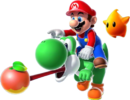 Yoshi |
A dinosaur-like creature with a long tongue that can be ridden by Mario. He was recruited by the Lumas to help collect Power Stars, but he became too overwhelmed and was locked within an egg by a Magikoopa. Yoshi can eat enemies and latch onto flowers by pointing at them on-screen with the Wii Remote's cursor. He can Flutter Jump to gain height and prolong his fall. Yoshi has many of the same abilities as Mario, including the Spin, Side Somersault, and Back-flip. When the player gets damaged, Mario falls off Yoshi and Yoshi runs off. Yoshi has a house on the starting planet of Sky Station Galaxy and refers to himself as a "space dragon". | Yoshi Star Galaxy, Hightail Falls Galaxy, Tall Trunk Galaxy, Haunty Halls Galaxy, Beat Block Galaxy, Bowser Jr.'s Fearsome Fleet, Starshine Beach Galaxy, Sweet Mystery Galaxy, Flash Black Galaxy, Bowser's Galaxy Generator, Twisty Trials Galaxy, Grandmaster Galaxy, Starship Mario |
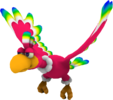 Fluzzard |
A big bird similar to a paraglider. Mario holds onto his talons and glides with him during the Fluzzard gliding minigame. He is spoken for by the Jibberjays. One states that Fluzzard has taken a liking to Mario. He is apparently quite shy. | Wild Glide Galaxy, Fleet Glide Galaxy |
Non-playable characters
In addition to the characters listed below, a Mii can be set as the file select icon for the player's saved file.
| Name | Description | Locations |
|---|---|---|
 Baby Luma |
Mario's traveling companion – a young Luma who resides under his cap. He grants Mario the ability to Spin and travel through space. Mario first encounters him collapsed on a road leading to Peach's Castle and he immediately takes a liking to him. At the end of the game, Baby Luma keeps his cap as a memento. | All galaxies |
 Princess Peach |
The ruler of the Mushroom Kingdom. She invites Mario to her castle to watch the shooting stars fall from the sky. However, upon arriving, he finds her in Bowser's grasp. She is whisked away to the center of the universe. The game follows Mario's quest to save her. She periodically sends letters of encouragement to Mario that contain five 1-Up Mushrooms, even when the player is controlling Luigi. Lubba refers to Peach as Mario's "special one". | Mushroom Kingdom, Bowser's Galaxy Generator |
 Lubba |
A portly, wisecracking Luma. He is the leader of a band of young Lumas who travel through space on a starship that they built themselves. As an innocent bystander to Bowser's galactic conquests, Lubba's ship was damaged by meteorites. This causes several of his Lumas to become lost in space and the ship to lose its source of energy – the Power Stars. Lubba cuts a deal with Mario after he is rescued by some of his Lumas: if he collects Power Stars for him, he will allow Mario to use his ship and take him to rescue Princess Peach. Once in agreement, Lubba reshapes the starship into Mario's likeness and starts to affectionately call him "captain". Lubba reacts to the player's actions in-game even though he remains on Starship Mario. For example, if the player is having a difficult time completing a course, he provides words of assurance and appreciation. Lubba considers the Lumas he travels with to be his family. | Starship Mario |
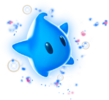 Lumas |
Star children that make their home on Starship Mario. Lumas appear trapped in several galaxies. Freeing them enables Mario to progress through the level. They otherwise appear in missions in order to help Mario, either by transforming into Launch Stars, directing him towards the right path, or giving him tips on progression. Lumas become celestial bodies when they grow up, and which ones they become is dependent on their color. They eat Star Bits and squeal with delight when fed via the Star Pointer. The Lumas encountered at the start of the game are already familiar with Mario. | Mushroom Kingdom, Sky Station Galaxy, Yoshi Star Galaxy, Spin-Dig Galaxy, Cosmic Cove Galaxy, Bowser's Lava Lair, Bowser's Gravity Gauntlet, Space Storm Galaxy, Clockwork Ruins Galaxy, Bowser's Galaxy Generator, Starship Mario |
 Big Lumas |
Enormous Lumas. Unlike normal-sized Lumas, these ones do not twirl if spun against and speak at a slightly lower octave. While Lumas can be many different colors, the giant Lumas are all yellow. | Supermassive Galaxy |
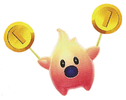 Hungry Lumas |
Big, voracious Lumas that can be encountered on the world map. They transform into galaxies when fed a specified number of Star Bits. Hungry Lumas that only eat coinage can be encountered in levels and transform into new planets if fed a specified amount of coins. These new planets always give Mario access to a hidden Power Star. | Fluffy Bluff Galaxy, Puzzle Plank Galaxy, Hightail Falls Galaxy, Cosmic Cove Galaxy, Cloudy Court Galaxy, Clockwork Ruins Galaxy, Battle Belt Galaxy, Starship Mario |
 Lumalees |
Big Lumas that run the Luma Shops. One typically precedes a boss encounter and transforms into a mushroom of choice in exchange for thirty Star Bits. A pair of Lumalees live inside Starship Mario's left ear. One transforms into a Chance Cube if fed thirty Star Bits. The other transforms into five if fed one-hundred coins. | Spin-Dig Galaxy, Puzzle Plank Galaxy, Boulder Bowl Galaxy, Freezy Flake Galaxy, Bowser Jr.'s Fiery Flotilla, Flipsville Galaxy, Slipsand Galaxy, Shiverburn Galaxy, Battle Belt Galaxy, Boss Blitz Galaxy, Starship Mario |
 Toads |
Denizens of the Mushroom Kingdom. They are mushroom people that come in a variety of colors. Toads are celebrating the Star Festival when Peach is abducted. | Mushroom Kingdom |
Toad Brigade |
A five-member team of Toads looking for Princess Peach. They travel through space in search of Power Stars aboard their Starshrooms, mushroom-shaped starships. The Red Toad is the self-designated captain. He will bring the brigade into dangerous sitatuions. The knowledgeable Blue Toad believes his position as the leader is questionable, and that he can be quite lazy. The other members include a green bank teller, a purple mail carrier, and a sleepy Yellow Toad. | Fluffy Bluff Galaxy, Flip-Swap Galaxy, Rightside Down Galaxy, Boulder Bowl Galaxy, Bowser's Lava Lair, Flipsville Galaxy, Bowser Jr.'s Boom Bunker, Battle Belt Galaxy, Slimy Spring Galaxy, Rolling Coaster Galaxy, Grandmaster Galaxy, Starship Mario |
 Banktoad |
A member of the Toad Brigade who sets up a bank for Star Bits on the Starship Mario. He gives Mario 1-Up Mushrooms in exchange for storing Star Bits. When out on missions with their brigade, he typically is equipped with a pickaxe. | Fluffy Bluff Galaxy, Flip-Swap Galaxy, Rightside Down Galaxy, Boulder Bowl Galaxy, Bowser's Lava Lair, Flipsville Galaxy, Bowser Jr.'s Boom Bunker, Rolling Coaster Galaxy, Grandmaster Galaxy, Starship Mario |
 Mailtoad |
A member of the Toad Brigade who runs a postal service on the Starship Mario. He delivers mail for Mario, Luigi, and the baby Luma. He can be prompted to view all letters previously received. | Fluffy Bluff Galaxy, Flip-Swap Galaxy, Rightside Down Galaxy, Boulder Bowl Galaxy, Bowser's Lava Lair, Flipsville Galaxy, Bowser Jr.'s Boom Bunker, Battle Belt Galaxy, Rolling Coaster Galaxy, Grandmaster Galaxy, Starship Mario |
 The Chimp |
A monkey who considers himself the "best in the universe". He recognizes Mario as his greatest rival and periodically challenges him to a contest via mail. The Chimp is the host of the skating minigame and the 10,000-point jumping challenge. He expresses his admiration for Mario and awards him with a Power Star if he beats his high-score in either. | Fluffy Bluff Galaxy, Freezy Flake Galaxy, Honeyhop Galaxy, Shiverburn Galaxy, Melty Monster Galaxy, Slimy Spring Galaxy |
 Star Bunnies |
Spacefaring rabbits that like to play. They teach Mario how to use his spin ability after jumping to gain extra height. A community of rabbits live on Freezy Flake Galaxy, where at least one is seen living in a miniature log cabin. They often end their sentences with "boiyoing" and sport Toad-like vests. | Flip-Swap Galaxy, Cosmic Cove Galaxy, Freezy Flake Galaxy, Flip-Out Galaxy, Starship Mario |
 Gearmos |
Maintenance robots with an obsession for orderliness. They run a facility that destroys Chomps and teach the player how to make the most out of their Spring form. An overworked individual hosts the crate burning minigame. There are gold and silver Gearmos who give Mario a Power Star in exchange for bringing them a Goomba and Spiky Topman, respectively. | Rightside Down Galaxy, Boulder Bowl Galaxy, Tall Trunk Galaxy, Chompworks Galaxy, Space Storm Galaxy, Upside Dizzy Galaxy, Starship Mario |
 Penguins |
Carefree, flightless birds who love swimming. They share swimming techniques with Mario when prompted. Most penguins are young birds that are a little shorter than Mario, but the two adults in the game – Penguru and Coach – tower over him. | Cosmic Cove Galaxy, Starship Mario |
 Penguru |
A knowledgeable, elderly penguin. He shares cryptic hints on level progression when prompted. | Hightail Falls Galaxy, Cosmic Cove Galaxy |
 Coach |
A big penguin that teaches young birds how to swim. During the "Exploring the Cosmic Cavern" mission, he keeps watch over a trapped Luma while his students search for a key to free it. He has a kind and paternal disposition. | Cosmic Cove Galaxy |
 Jibberjays |
Excitable birds that host the Fluzzard gliding minigame. One of the orange Jibberjays gives Mario a tutorial on how to fly with Fluzzard. They recognize Mario as their leader if he out-glides the competitive black Jibberjay, who periodically challenges him to a race via postage. | Wild Glide Galaxy, Fleet Glide Galaxy, Starship Mario |
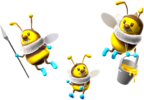 Honeybees |
Bee people in search of Power Stars for their queen. They teach the player how to use their Bee form. They award Mario with a "Certificate of Commendation" for locating the hidden Power Star in Honeybloom Galaxy. | Honeybloom Galaxy, Honeyhop Galaxy, Starship Mario |
 Queen Bee |
The ruler of the Honeybees and Honeyhop Galaxy. She mistakes Mario for a new bee, even if he is not in his Bee form, and ask him to take care of an "itchiness" for her. Her body can be clung to by the player. Queen Bee's gentle and calm disposition contrasts with her large size. | Honeyhop Galaxy |
 Whittles |
Wise wood people similar to kodama. They teach Mario how to use his Cloud form, the Dash Pepper, and the Blimp Fruit. The giant tree of Tall Trunk Galaxy is sacred to them. A Whittle with an oblong head has some position of authority. It recognizes Mario's bravery with a Power Star if he ventures down Tall Trunk's Big Slide. | Fluffy Bluff Galaxy, Hightail Falls Galaxy, Tall Trunk Galaxy, Clockwork Ruins Galaxy, Starship Mario |
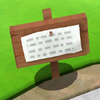 Bill Board |
A talking board that calls out to Mario and teaches him how to use the Star Ball. | Rolling Masterpiece Galaxy, Battle Belt Galaxy |
 Piantas |
Cheerful mountain people that wear grass skirts and grow palms from their heads. During the Strongest Pianta Competition, some individuals toss Mario to great heights if approached. A green Pianta runs a leaf raft shop and allows Mario to use it. | Starshine Beach Galaxy |
 Bob-omb Buddies |
Friendly Bob-ombs that lack fuses. Their Power Star was stolen by the Whomp King. They affectionately refer to Mario as "'stache man" and at least one seems to recognize him. The Bob-omb Buddy who boards Starship Mario speaks of a mythical world prior to the final showdown with Bowser. | Throwback Galaxy, Starship Mario |
 Rosalina |
A mysterious woman who serves as the guardian of the cosmos. She travels through space via the Comet Observatory, a vessel she built for the Lumas. Her observatory is encountered before reaching the center of the universe, where Bowser's Galaxy Generator is attempting to consume it. The baby Luma considers Rosalina to be his mother and she periodically sends letters containing fifty Star Bits to him throughout the course of the game. When encountered in-person, she already knows who Mario is and Lubba mentions having met her before. It is revealed towards the end of the game that she is the narrator of its story. Rosalina appears at the very end of Grandmaster Galaxy, where she gives Mario the final Power Star. | Grandmaster Galaxy, Starship Mario |
 Cosmic Spirit |
An entity in the form of Rosalina. She appears in a galaxy if Mario loses a significant amount of lives and offers to "guide" him to the Power Star. Agreeing causes her to take control of Mario's body and progress through the level. The player can press |
Sky Station Galaxy, Fluffy Bluff Galaxy, Flip-Swap Galaxy, Bowser Jr.'s Fiery Flotilla, Hightail Falls Galaxy, Boulder Bowl Galaxy, Tall Trunk Galaxy, Haunty Halls Galaxy, Supermassive Galaxy, Flipsville Galaxy, Chompworks Galaxy, Slipsand Galaxy, Melty Monster Galaxy, Battle Belt Galaxy, Mario Squared Galaxy, Rolling Coaster Galaxy, Twisty Trials Galaxy, Stone Cyclone Galaxy, Boss Blitz Galaxy, Flip-Out Galaxy |
Enemies and obstacles
Enemies
Sorting the "galaxy" columns organizes them by occurrence in-game, not alphabetically.
| Name | Description | Galaxies | Spoils | New | |
|---|---|---|---|---|---|
| First | Last | ||||
 Goomba |
Squat mushroom creatures that chase Mario when he is in their line of sight. A Goomba is defeated when stomped. Spinning or shooting one with a Star Bit knocks it over and makes it spin like a top, leaving it vulnerable to being kicked. The gold Gearmo asks Mario to lure one to her so she can keep it as a pet. | Sky Station Galaxy | Slimy Spring Galaxy | Template:Chart icon×1 Template:Chart icon×3 |
— |
 Paragoomba |
Winged Goombas. They fly back-and-forth in set trajectories. Spinning one causes its wings to fall off and reverts it back to a normal Goomba. | Sky Station Galaxy | Grandmaster Galaxy | Template:Chart icon×1 Template:Chart icon×3 |
— |
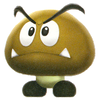 Mini Goomba |
Little Goombas. Like normal-sized ones, they charge towards. They are defeated when spun. | Sky Station Galaxy | Rolling Coaster Galaxy | Template:Chart icon×1 | — |
 Giant Goomba |
A giant Goomba. It is defeated only when spun and kicked. | Supermassive Galaxy | Template:Chart icon×7 | — | |
 Big Paragoomba |
Giant Paragoombas that fly back-and-forth. Spinning into them leaves them upside-down and dazed, with their wings fallen off. Kicking them in this state defeats them. If left undisturbed, they right themselves and behave as Giant Goombas. | Supermassive Galaxy | Template:Chart icon×7 | Template:Chart icon | |
 Jack O'Goomba |
Slow-moving Goombas with Jack-o'-lanterns covering their heads. A Jack O'Goomba sometimes drops a blue flame behind it that burns Mario on contact. Ground Pounding one defeats it. Spinning one breaks the pumpkin and reverts it into a normal Goomba. | Haunty Halls Galaxy | Flash Black Galaxy | Template:Chart icon×1 | — |
 Goombeetle |
Helmeted Goombas that cannot be stomped. Spinning one flips it upside down, exposing its vulnerable underside. | Bowser Jr.'s Fiery Flotilla | Chompworks Galaxy | Template:Chart icon×1 | — |
 Octoomba |
Goomba-like octopus enemies. An Octoomba shuffles side to side along a set path and keeps its eyes locked onto Mario when he is near. When in close proximity, it attempts to strike him with the hair-like appendage on its head. Octoombas are defeated when stomped or spun. | Sky Station Galaxy | Stone Cyclone Galaxy | Template:Chart icon×1 Template:Chart icon×3 |
— |
 Elite Octoomba |
Strong Octoombas that fire two consecutive rocks from their siphon. Though they sidestep back-and-forth along set paths, they turn to face Mario as he moves. If the first rock misses, the second one may strike him if he does not keep moving. | Sky Station Galaxy | Clockwork Ruins Galaxy | Template:Chart icon×1 Template:Chart icon×3 |
Template:Chart icon |
 Octoguy |
Red octopuses that spit rocks. Octoguys shuffle backward from Mario when approached and only stop to attack Mario. One is defeated when stomped or spun. They usually occur in groups. | Boulder Bowl Galaxy | Shiverburn Galaxy | Template:Chart icon×1 Template:Chart icon×3 |
— |
 Rocto |
Big octopuses that sit in barrels. Roctos spit coconuts[note 2] and flaming rocks at Mario. The coconuts can be ricocheted back with a well-timed spin. This is the only way to defeat a Rocto. | Shiverburn Galaxy | Grandmaster Galaxy | None | — |
 Slurple |
Leech-like octopuses. They latch onto Mario and gradually deplete his life meter. Spinning defeats them. | Puzzle Plank Galaxy | Upside Dizzy Galaxy | Template:Chart icon×1 | — |
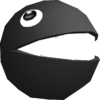 Small Chomp |
Little Chomps that roll around in circles. They cannot be damaged directly, only when struck by rubbery bulbs. | Sky Station Galaxy | Chompworks Galaxy | Template:Chart icon×3 Template:Chart icon×1 |
— |
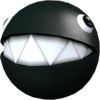 Chomp |
Rolling metal enemies. Chomps bark when in close proximity and break when they roll into walls. There are diminishing returns with Chomps: if Mario stays in an area where Chomps are continuously breaking, they drop fewer Star Bits each time and eventually stop all together. | Flip-Swap Galaxy | Chompworks Galaxy | Template:Chart icon×7 | — |
 Gold Chomp |
A Chomp made of gold. | Chompworks Galaxy | Template:Chart icon×1 | — | |
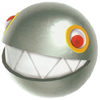 Homing Chomp |
Chomps with crazed eyes. They home-in on Mario. Contact damages Mario. They can only be defeated by spinning rubbery bulb plants into them, or by knocking them into bottomless pits. | Rolling Masterpiece Galaxy | Battle Belt Galaxy | Template:Chart icon×10 | Template:Chart icon |
 Banzai Bill |
Slow-moving missiles. Their line of trajectory is fixed in one direction, and they slowly rotate as they move. | Sky Station Galaxy | Bowser's Galaxy Generator | None | — |
 Bullet Bill |
Missiles fired from Bill Blasters. Bullet Bills directly target Mario when he is within their proximity. Mario can lure Bullet Bills towards cages and fences to break them. Their eyes flash red and their bodies twirl when they lock onto Mario. Yoshi cannot swallow Bullet Bills, but he can hold them in his mouth and fire them. A Bullet Bill explodes and damages Mario if it is held in Yoshi's mouth for too long. | Bowser Jr.'s Fearsome Fleet | Grandmaster Galaxy | None | — |
 Amp |
Smiling, electrical orbs. They typically travel in circular patterns and shock Mario on contact. | Sky Station Galaxy | Space Storm Galaxy | Template:Chart icon | — |
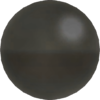 Zap Ball |
Large Amps that travel in circles and damage Mario on contact. Zap Balls typically occur in pairs. | Space Storm Galaxy | Template:Chart icon | — | |
 Cosmic Clone |
Dark entities in the form of Mario. They appear in sections of galaxies and trail Mario, mimicking his every move and positioning. Crossing paths with a Cosmic Clone causes damage to Mario and makes the clone disappear. Cosmic Clones continuously emerge from a small rupture of shadow in an area. Completing a necessary objective (i.e. activating all Flipswitch Panels) in the area closes the rupture and defeats all of the clones at once. | Sky Station Galaxy | Flip-Out Galaxy | Template:Chart icon×3 | Template:Chart icon |
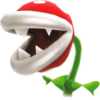 Piranha Plant |
Carnivorous plants that try to bite Mario when near and laugh if they land a hit. They idly hold their heads skyward like normal flowers until they are approached. Piranha Plants are defeated when stomped or spun, and stunned when struck by a Star Bit. Defeating a Piranha Plant sometimes causes a Sproutle Vine to erupt from the ground. | Sky Station Galaxy | Throwback Galaxy | Template:Chart icon×1 Template:Chart icon×3 Template:Chart icon×1 |
— |
 Super Piranha Plant |
Giant Piranha Plants. They rest in giant pipes filled with soil. They burst from the soil in set intervals that can be timed. | Supermassive Galaxy | Template:Chart icon | — | |
 Prickly Piranha Plant |
A Spiny Piranha Plant with additional spines on its head. The spines damage Mario on contact and prevent its body from direct harm. Spinning a rubbery bulb plant into it defeats it. There is only one in the game. | Sky Station Galaxy | Template:Chart icon×1 | Template:Chart icon | |
 Spiny Piranha Plant |
Large Piranha Plants that slam their heads into the ground. Spinning one stuns it and leaves to vulnerable to being stomped. | Rightside Down Galaxy | Throwback Galaxy | Template:Chart icon×7 | — |
 Prickly plant |
Plants with damaging, needle-like flowers. One is destroyed only through the use of projectiles, like rubbery bulbs. They can be eaten by Yoshi. | Yoshi Star Galaxy | Boss Blitz Galaxy | Template:Chart icon×3 Template:Chart icon×1 |
— |
 Magikoopa |
Robed Koopas that teleport. Magikoopas toss magical fireballs at Mario with their wand, which they also use to block shot Star Bits. | Yoshi Star Galaxy | Bowser's Galaxy Generator | Template:Chart icon×1 | — |
 Lakitu |
Cloud-riding Koopas. They closely follow Mario and toss Spiny Eggs at him. Yoshi can eat the cloud, leaving the Lakitu helplessly flailing on the ground. When in proximity, Lakitus emit a consecutive high-pitched ringing sound. | Yoshi Star Galaxy | Starshine Beach Galaxy | Template:Chart icon×3 | — |
 Spiny |
Stout Koopas with spikes on their carrapaces. The spikes protect them from being jumped on and damage Mario on contact. They charge towards him if he is in proximity. Yoshi cannot swallow Spinies, but he can shoot them out as projectile Spiny Eggs. | Yoshi Star Galaxy | Starshine Beach Galaxy | Template:Chart icon×1 | — |
 Spiny Egg |
The retracted form of Spinies. They are tossed by Lakitus and spit out as projectiles by Yoshi. Direct contact damages Mario. | Yoshi Star Galaxy | Starshine Beach Galaxy | None | — |
 Dry Bones |
Undead Koopa Troopas. Dry Bones chase down and tackle Mario on sight. If one is stomped, spun, or hit with a shell, it crumbles into a pile of bones, but reassembles after a few seconds. Dry Bones are defeated only when lured into lava or quicksand. | Bowser Jr.'s Fiery Flotilla | Bowser's Galaxy Generator | Template:Chart icon×3 | — |
 Koopa Troopa |
Green-shelled turtles. Koopa Troopas walk back and forth in straight lines. One retreats into its shell when stomped, allowing Mario to pick it up. | Cosmic Cove Galaxy | Template:Chart icon×1 | — | |
 Giant Koopa |
Giant Koopa Troopas. Striking them with a Spin Drill defeats them. They are not vulnerable to being stomped and do not retract into their shells. | Supermassive Galaxy | Template:Chart icon×1 | — | |
 Hammer Bro |
Helmeted Koopas that throw hammers. They toss three hammers in succession before hoping to a new position. Yoshi can swallow a hammer and spit it back as a projectile. Jumping on a Hammer Bro leaves it incapacitated and vulnerable to attack. | Bowser's Lava Lair | Grandmaster Galaxy | Template:Chart icon×1 Template:Chart icon×3 Template:Chart icon×1 |
— |
 Boomerang Bro |
Hammer Bro relatives that wield boomerangs. The boomerangs can be swallowed by Yoshi and spitted out as a projectile. | Bowser Jr.'s Boom Bunker | Grandmaster Galaxy | Template:Chart icon×1 Template:Chart icon×3 Template:Chart icon×1 |
— |
 Flipbug |
Insect enemies that eat bees. Flipbugs attempt to flee from Mario when he is near, ultimately tiring out and collapsing upside-down on the ground. If spotted in his Bee form, they chase him. | Yoshi Star Galaxy | Honeyhop Galaxy | Template:Chart icon×1 Template:Chart icon×3 |
— |
 Mandibug |
Big stink bug enemies. Mandibugs charge at Mario after making visual contact, snapping their jaws. They are defeated when Ground Pounded. One trembles if Mario stands on its back, but eventually shakes him off. | Puzzle Plank Galaxy | Template:Chart icon×1 | — | |
 Smeech |
Winged Poinks. They quickly fly away from Mario if approached by him. If approached by Yoshi, they pursue him with smacking lips and latch onto his mouth. This prevents Yoshi from using his tongue or eating fruits. Spinning while a Smeech is attached dislodge it from Yoshi's mouth and defeats it. | Yoshi Star Galaxy | Sweet Mystery Galaxy | Template:Chart icon×1 Template:Chart icon×3 |
Template:Chart icon |
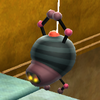 Spangler |
Spiders hanging from silk. Spanglers sway back and forth to strike Mario. Spinning one stuns it. It otherwise can be stomped. | Yoshi Star Galaxy | Tall Trunk Galaxy | Template:Chart icon×1 Template:Chart icon×3 |
— |
 Spoing |
Spiders that hop up and down. A Spoing is stunned when shot by a Star Bit. It is defeated when stomped. Spoings stop to laugh if they strike Mario. | Tall Trunk Galaxy | Flip-Out Galaxy | Template:Chart icon×1 Template:Chart icon×3 |
— |
 Digga |
Drill enemies that tunnel through earth. Jumping on their backs or attacking them with a Spin Drill defeats them. Digga-Leg expels Diggas from its head during its boss fight. | Spin-Dig Galaxy | Template:Chart icon×1 | Template:Chart icon | |
 Twirlip |
Spinning flower enemies. They periodically open their flowers and spin rapidly in circles. Twirlips can only be jumped on while they are twirling, and they can only be spun into when they are closed. | Spin-Dig Galaxy | Starshine Beach Galaxy | Template:Chart icon×1 Template:Chart icon×3 |
Template:Chart icon |
 Flaptack |
Squat birds with a horn on their head. They idly flutter in place. When in proximity to Mario, they fly towards him, turn upside down, and slam themselves into the ground below in an attempt to strike him. They are temporarily stuck into the ground and can be defeated. Flaptacks sometimes are not within the player's field of view, but they can still be spotted by their large shadow they cast. Shooting a Flaptack dazes it and makes it fall to the ground. | Fluffy Bluff Galaxy | Flash Black Galaxy | Template:Chart icon×1 Template:Chart icon×3 |
Template:Chart icon |
 Bomp |
Stones that shift in and out of walls. They cannot damage Mario directly, but they are positioned to push him off of platforms and solid ground. The tops of their bodies can be stood on. | Fluffy Bluff Galaxy | Throwback Galaxy | Template:Chart icon | — |
 Swaphopper |
Insect creatures that hop from side-to-side. Their tops are protected by a spiked shell that damages Mario on contact, but their undersides are defenseless. Shifting the gravitational plane using gravity switches alters which side points upward, which is the only way Mario can gain access to their damageable undersides. While right-side up, a Swaphopper looks aggressive and slowly pursues Mario. When flipped over, it looks cowardly and tries to move away. | Rightside Down Galaxy | Battle Belt Galaxy | Template:Chart icon×1 | Template:Chart icon |
 Thwomp |
Grimacing stones. Thwomps suspend themselves above ground and periodically slam into the earth below. Crushing Mario fully depletes his life meter. The tops and sides of a Thwomp can be used as platforms and walls. | Rightside Down Galaxy | Stone Cyclone Galaxy | Template:Chart icon | — |
 Big Thwomp |
Enormous Thwomps. The pair found in the game are close enough to be wall jumped between. | Supermassive Galaxy | Template:Chart icon | — | |
 Wiggler |
Caterpillars that walk around in circles. Performing a Ground Pound on nearby earth or directly spinning a Wiggler flips it onto its back. If it is not defeated within five seconds, it becomes angry and uprights itself. An enraged Wiggler is faster and cannot be harmed. It calms down after a few seconds. Ground Pounding a Wiggler defeats it in a single blow. | Puzzle Plank Galaxy | Throwback Galaxy | Template:Chart icon×7 | — |
Big Wiggler |
Giant Wigglers that are too large to harm. Some are in a permanent state of anger that makes them faster and harder to avoid. | Supermassive Galaxy | Template:Chart icon | — | |
 Grinder |
Big saw blades. They damage Mario on contact and destroy wooden platforms. | Puzzle Plank Galaxy | Rolling Masterpiece Galaxy | Template:Chart icon | — |
 Kleptoad |
Frogs that pop out of the ground indefinitely. They carry coins and Silver Stars in bubbles above their heads. | Hightail Falls Galaxy | Template:Chart icon×1 Template:Chart icon×1 |
Template:Chart icon | |
 Pinhead |
Stationary bowling pin creatures. Pinheads are skittish: they sit above trapdoors that they fall through when approached by Mario. They can only be defeated by Mario when he rolls into them in his Rock form. They typically sit in groups of six. | Boulder Bowl Galaxy | Melty Monster Galaxy | Template:Chart icon×3 100 pts. |
Template:Chart icon |
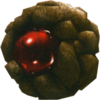 Ruby Rock |
Boulders with red gems in their center. Ruby Rocks roll around in circles, damaging Mario on contact. Spinning into the gem of one breaks it. | Boulder Bowl Galaxy | Template:Chart icon×7 | — | |
 Snoodle |
Benthic creatures that look like the giant tube worm. They protrude from holes on the seafloor and extend their heads towards Mario to strike him. They are vulnerable to beacons of light from Green Shells, but they are defeatable through typical means as well (i.e. spin, or thrown projectile). | Cosmic Cove Galaxy | Slimy Spring Galaxy | Template:Chart icon×3 | Template:Chart icon |
 Spiny Cheep Cheep |
Porcupinefish-like Cheep Cheeps that protract their spines and charge towards Mario on sight. | Cosmic Cove Galaxy | Template:Chart icon×7 | — | |
 Cheep Cheep |
Pudgy red fish. In 2D areas, they swim in fixed paths. In 3D ones, the swim near the surface. They are defeated when stomped or spun. | Cosmic Cove Galaxy | Bowser's Gravity Gauntlet | Template:Chart icon×1 Template:Chart icon×3 |
— |
 Jam-o'-War |
A large Jammyfish that idly floats in place and electrocutes Mario when touched. Striking the Jam-o'-War with a shell twice defeats it. The first strike turns it green. | Cosmic Cove Galaxy | Template:Chart icon×1 | — | |
 Jammyfish |
Jellyfish that swim in schools along set paths. They damage Mario on contact but do not actively pursue him. | Cosmic Cove Galaxy | Template:Chart icon×1 | — | |
 Skeeter |
Insect enemies that look like water striders. They skim on the surface of the water and make short bursts of movement by contracting their legs. | Cosmic Cove Galaxy | Throwback Galaxy | Template:Chart icon×1 Template:Chart icon×3 |
— |
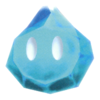 Li'l Brr |
Floating ice enemies that freeze Mario on contact. Spinning a Li'l Brr neutralizes its icy cloud and grounds it, leaving it vulnerable to being kicked. Neutralized Li'l Brrs weakly hop on the ground. | Cosmic Cove Galaxy | Battle Belt Galaxy | Template:Chart icon×1 | — |
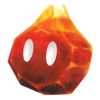 Li'l Cinder |
Floating fire enemies that burn Mario on contact. Li'l Cinders otherwise behave like Li'l Cinders. Grounded Li'l Cinders hop towards the nearest lava to reignite. | Bowser's Lava Lair | Mario Squared Galaxy | Template:Chart icon×1 | — |
 Gringill |
Conger eel enemies. Gringills lunge at Mario if he approaches the mouth of their caves. | Cosmic Cove Galaxy | Slimy Spring Galaxy | Template:Chart icon | — |
 Big Gringill |
Large Gringills restricted to underwater caves. They snap at Mario when approached. Big Gringills react slower than the normal-sized ones. | Starshine Beach Galaxy | Template:Chart icon | — | |
 Mikey Mine |
Naval mines that travel in water on fixed paths. They regenerate after detonating. | Cosmic Cove Galaxy | None | — | |
 Space Mine |
Midair Mikey Mines. Most are inert, but some move along purple streaks of light. A Space Mine explodes when touched, causing damage. Shooting one with a Star Bit destroys it. | Bowser Jr.'s Fearsome Fleet | Grandmaster Galaxy | Template:Chart icon×3 | — |
 Micro Mecha-Bowser |
Mechanical Koopas that breathe fire. Spinning Micro Mecha-Bowsers swing their heads back and delays their fire attack. They are defeated when Ground Pounded. | Cosmic Cove Galaxy | Flipsville Galaxy | Template:Chart icon×1 | — |
 Fizzlit |
Amorphous creatures that bounce around Mario. They periodically halt and flatten themselves into yellow pubbles which discharge electricity. They cannot be harmed in this state, and direct contact electrocutes Mario. Yoshi is forced back into his egg if he attempts to eat a Fizzlit in this state. | Cosmic Cove Galaxy | Bowser Jr.'s Boom Bunker | Template:Chart icon×1 Template:Chart icon×3 |
Template:Chart icon |
 Choppah |
Helmeted creatures that hover in midair. They fly in set horizontal or vertical trajectories. Mario cannot defeat them himself and making contact damages him, but Yoshi can eat them. Shooting one with a Star Bit stuns it in-place for three seconds. | Honeybloom Galaxy | Grandmaster Galaxy | Template:Chart icon×3 | Template:Chart icon |
 Fuzzy |
Black, furry creatures. They are obstacles that move along suspended treaded paths. | Honeybloom Galaxy | Flipsville Galaxy | Template:Chart icon×3 | — |
 Spindleburr |
Variants of the rubbery bulb plant with protractible spines. When in proximity to Mario,[note 1] their spines extend and they sling their bulbs towards him. Some Spindleburrs are rooted upside-down. | Honeybloom Galaxy | Template:Chart icon | Template:Chart icon | |
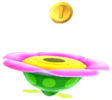 Trapdragon |
Hovering flowers which can be boarded like platforms. When idle, they look like broad, pink flowers. When Mario stands on one, a white rim protrudes from the edges of the flower and snaps shut after three seconds. Mario is damaged if he is on top of it when it closes. | Honeybloom Galaxy | Honeyhop Galaxy | Template:Chart icon | Template:Chart icon |
 Lava Bubble (Red) |
Incandescent, leaping drops of lava. They occur between gaps in platforms that cover lava. | Bowser's Lava Lair | Melty Monster Galaxy | Template:Chart icon | — |
 Lava Bubble (Blue) |
Blue Lava Bubbles appear during the battle with King Kaliente. Shooting one with a Star Bit defeats it. They otherwise burnout and disappear on their own. | Boss Blitz Galaxy | None | — | |
 Whomp |
Walking stone walls similar to nurikabe. When Mario is before them, they quicken their pace and slam down face first to crush him. A successful strike completely depletes Mario's life meter, costing him a life. Their attack leaves them lying on the ground and vulnerable for a few seconds. Their weak point is a cylindrical button with a ground-pound symbol on it. | Bowser's Lava Lair | Throwback Galaxy | Template:Chart icon×7 | — |
 Whimp |
Diminutive Whomps. They appear in groups of three or five and rush down Mario. When close, they fling themselves face first to strike him. A successful strike damages Mario. They fall apart after attacking. The Whomp King summons them during his boss fight. | Throwback Galaxy | None | Template:Chart icon | |
 Flomp |
Suspended stone platforms. They rapidly spin for one second in three second intervals. If Mario is on top of a Flomp when it spins, he falls through it. They appear in pairs or more. | Bowser's Lava Lair | Grandmaster Galaxy | Template:Chart icon | Template:Chart icon |
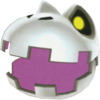 Mattermouth |
Disembodied skulls that chomp through matter. They leave a trail of empty space behind them that Mario can fall through, but it gradually reemerges. Jumping on a Mattermouth causes it to change direction. | Bowser's Lava Lair | Haunty Halls Galaxy | Template:Chart icon | Template:Chart icon |
 Octoboo |
Ghostly Octoombas that hover in set paths. They appear in groups, usually hovering in a circular path, but in some instances they hover in continuous paths. Making direct contact damages Mario. Spinning into Octoombas makes them safely permiable for one second. | Haunty Halls Galaxy | Flash Black Galaxy | Template:Chart icon | Template:Chart icon |
 Mega Boo |
Enormous Boos. They appear once Mario crosses a specific corridor and slowly follow him, flanked by Big Boos. They cannot be defeated. | Haunty Halls Galaxy | Template:Chart icon | Template:Chart icon | |
 Boo |
Ghost enemies. Boos pursue Mario when his back is turned towards them. If Mario looks directly at one, it stops moving and shields its eyes. Spinning one shifts its position and forces it through nearby walls, but it is undamaged. Boos are weak only to light. Some Boos are found underwater. Mario can transform into one via the Boo Mushroom. | Haunty Halls Galaxy | Slimy Spring Galaxy | Template:Chart icon×1 | — |
 Bomb Boo |
Explosive Boos that pursue Mario on sight. Unlike normal Boos, Bomb Boos do not cower when Mario looks at them. When spun, Mario grabs onto a Bomb Boo's tongue and swings it like a lasso. It detonates if it is swung into an object or wall. If Mario does not release the Bomb Boo, it is pulled in closer and damages him. Bomb Boos are conjured by Bouldergeist and can destroy the boss's stone armor. | Boss Blitz Galaxy | None | — | |
 Gummit |
Creatures like the smackable moles in the Whac-A-Mole. They appear during The Chimp's Skating Challenge. During the challenge, they periodically pop out of holes in the ice. Mario accumulates points by skating into Gummits and kicking them. | Freezy Flake Galaxy | Shiverburn Galaxy | 10 pts. | Template:Chart icon |
 Spiky Gummit |
Gummits covered in spikes. Making contact does not damage Mario, but it causes knockback that costs Mario at least one second of time in The Chimp's Skating Challenge. | Freezy Flake Galaxy | Shiverburn Galaxy | Template:Chart icon | Template:Chart icon |
 Golden Gummit |
Gold Gummits. They appear in fewer numbers and retreat down their holes faster than the other Gummits. | Freezy Flake Galaxy | Shiverburn Galaxy | 50 pts. | Template:Chart icon |
 Bob-omb |
Walking bombs. Bob-ombs actively pursue Mario until they explode. | Rolling Masterpiece Galaxy | Rolling Coaster Galaxy | None | — |
 Undergrunt Gunner |
Blue Montys in hovercrafts. Each one is equipped with a Bill Blaster. Undergrunt Gunners are defeated only when struck by Bullet Bills. | Bowser Jr.'s Fearsome Fleet | Fleet Glide Galaxy | Template:Chart icon×5 | — |
 Undergrunt |
Undergrunts leave trails of disturbed dirt as they dig. Ground Pounding nearby earth forces them to the surface, dazed and vulnerable. Their spiked helmets protects them from stomps. The helmets protrude from the ground as the Undergrunts burrow, allowing one to track their movements. | Battle Belt Galaxy | Template:Chart icon×3 | — | |
 Pupdozer |
Squat dinosaur creatures. Their backs are covered in spikes that protect them from harm and damages Mario on contact. Their bellies are unguarded: Ground-Pounding through a grate while a Pupdozer is above it defeats it. | Flipsville Galaxy | Template:Chart icon×1 | Template:Chart icon | |
 Water Shooter |
Mounted nozzles that shoot Water Balls over great distances. A ball traps Mario if he is within its trajectory and carries him with it. He is freed if he spins. | Starshine Beach Galaxy | Space Storm Galaxy | Template:Chart icon | — |
 Fire Shooter |
Mounted flamethrowers that shoot streams of fire. The flames recede in set intervals that can be timed. | Bowser's Galaxy Generator | Template:Chart icon | — | |
 Zap Nozzle |
Suspended electroshock devices that discharge balls of electricity from their nozzles. The balls slowly trail after Mario and electrocute him on contact. | Space Storm Galaxy | Template:Chart icon | Template:Chart icon | |
 Crabber (Red) |
Sidestepping crabs that slowly pursue Mario. Crabbers have hard shells that protect them from stomps and spins head-on, but their fleshy rears are exposed and can be struck. Red Crabbers cannot be swallowed by Yoshi, but he can spit out a projectile claw that works like a boomerang. | Boulder Bowl Galaxy | Battle Belt Galaxy | Template:Chart icon×3 Template:Chart icon×1 |
— |
 Crabber (Blue) |
Blue Crabbers that scuttle away from Mario. They bury themselves underground in an attempt to escape and resurface shortly after. | Boulder Bowl Galaxy | Battle Belt Galaxy | Template:Chart icon×1 | — |
 Tracks |
Invisible purse-like creatures. Tracks are only visible when the stop moving. They are otherwise only perceptible by tracking their footsteps. Defeating one awards Mario with a large number of Star Bits. | Starshine Beach Galaxy | Template:Chart icon×20 | — | |
 Blooper |
Underwater squids. Bloopers swim erratically when approached by Mario to strike him. Spinning one or striking it with a shell defeats it. They release a cloud of ink when defeated. | Starshine Beach Galaxy | Template:Chart icon×3 | — | |
 Urchin |
Sea creatures with protractible spines. Urchins roll towards Mario when in close proximity. They are damaged only by shells. | Starshine Beach Galaxy | Slimy Spring Galaxy | Template:Chart icon×5 | — |
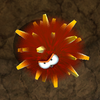 Hot Urchin |
Red Urchins found in warm areas. When Mario draws near, they protract their spines and roll towards him. Ground Urchins can only be defeated by fireballs. | Battle Belt Galaxy | Template:Chart icon×5 | — | |
 Clampy |
A giant clam that opens and closes its mouth. Star Chips or coins can be found inside it. Snapping shut with Mario inside damages him. | Starshine Beach Galaxy | Template:Chart icon | — | |
 Spinecone |
Slow-moving turbo snail enemies. They move in unilateral directions. Some can be found outside of water on ceilings and walls. | Starshine Beach Galaxy | Boo Moon Galaxy | Template:Chart icon | Template:Chart icon |
 Topman |
Top enemies. Spiky Topmen do not directly harm Mario, but they can knock him into hazards or off platforms. The spike on one's head protects it from being stomped and damages Mario on contact. Spiky Topmen are defeated if knocked into an electric rail or off the side of a platform. The silver Gearmo asks Mario to lure her one so she can keep it as a pet. | Space Storm Galaxy | Template:Chart icon×1 | — | |
 Spring Topman |
Green Topmen. Stomping a Spring Topman stuns it and allows Mario to use it like a springboard. | Space Storm Galaxy | None | — | |
 Topmini |
Little Topmen. Topminis cannot damage Mario and are immediately defeated when spun. There are small portals that continuously produce Topminis. | Space Storm Galaxy | Template:Chart icon×1 | — | |
 Spring Vault |
Topman-like beamers. Jumping on one's head launches Mario high into the air. | Space Storm Galaxy | None | — | |
 Pokey Head |
Green Pokeys. They are buried with only their flowers visible. When approached by Mario, they burst out of the ground and start hopping towards him. A Pokey Head bounces in place if it successfully strikes Mario. They are defeated when stomped or spun. | Slipsand Galaxy | Template:Chart icon×1 Template:Chart icon×3 |
— | |
 Cluckboom |
Plurp-like enemies that lay explosive eggs. Cluckbooms fly in set paths, fluttering back and forth. One falls to the ground when shot be a Star Bit, leaving it open to attack. | Slipsand Galaxy | Template:Chart icon×1 Template:Chart icon×3 |
— | |
 Rhomp |
Rolling stone beings. A rolling Rhomp flattens Mario and completely depletes his life meter. | Slipsand Galaxy | Template:Chart icon | Template:Chart icon | |
 Pulse Beam |
Spiked beamers that discharge shockwaves. One damages Mario when touched. | Shiverburn Galaxy | Grandmaster Galaxy | Template:Chart icon | — |
 Meteor |
Fiery space rocks that rain from the sky. | Hightail Falls Galaxy | Shiverburn Galaxy | None | — |
 Magmaargh |
Enormous Blarggs submerged in lava. They idly lie deep in lava with only their eyes, nostrils, and ears exposed. When in proximity to Mario, they burst to the surface with their jaws open wide and slam their faces forward to strike him. Direct contact burns Mario. They can phase through solid platforms. | Fleet Glide Galaxy | Bowser's Galaxy Generator | Template:Chart icon | Template:Chart icon |
 Magmaw |
Small Magmaarghs that endlessly shuffle through lava. They can pass through solid platforms. | Melty Monster Galaxy | Template:Chart icon | Template:Chart icon | |
 Bat |
Hog-nosed bats that roost in caves. They swoop down to attack Mario. A bat stops to laugh when it lands a hit. Stomping or spinning one defeats it. | Fleet Glide Galaxy | Slimy Spring Galaxy | Template:Chart icon×1 Template:Chart icon×3 |
— |
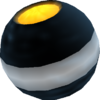 Cannonball |
Ammunition shot from enemy cannons. They slowly travel in straight lines and burst when they make contact with Mario. Shooting a cannonball with a Star Bit destroys it. | Fleet Glide Galaxy | None | — | |
 Sentry Beam |
Hovering beamers that fire lasers at Mario when he is close. Standing on top of a Sentry Beam temporarily prevents it from firing. | Mario Squared Galaxy | Grandmaster Galaxy | Template:Chart icon | — |
 Tox Box |
Stone boxes that roll around in set trajectories. Tox Boxes are the same width of the paths they travel, making them difficult to avoid. One of their sides is open and can be safely stood under. | Stone Cyclone Galaxy | Template:Chart icon | — | |
Obstacles
| Name | Description | Galaxies | |
|---|---|---|---|
| First | Last | ||
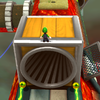 Banzai Bill Cannon |
Giant cannons that fire Banzai Bills. | Sky Station Galaxy | Bowser's Galaxy Generator |
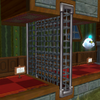 Bars |
Thin barriers that can only be phased through by Boo Mario while he is invisible. | Boo Moon Galaxy | |
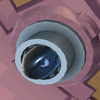 Bill Blaster |
The cannons that shoot Bullet Bills. Stand-alone blasters are covered in military camouflage. A blaster will not shoot more than one Bill at a time. Bill Blasters can be mounted onto the surface of planets or integrated into the walls of terrain. Many Bill Blasters are built into the body of Megahammer. | Bowser Jr.'s Fearsome Fleet | Grandmaster Galaxy |
Black hole |
Extremely dense voids with their own gravity. Mario will be pulled into black holes if he gets too close and will lose a life. They exist in the center of several planets and function similarly to bottomless pits. | Sky Station Galaxy | Stone Cyclone Galaxy |
 Bob-omb dispenser |
Depositories that release Bob-ombs. | Space Storm Galaxy | |
 Bowser Statue |
Stone statues of Bowser. Most statues are inanimate objects that contain items, but a few have glowing eyes and shoot beams of energy that damage Mario on contact. | Bowser's Lava Lair | Boo Moon Galaxy |
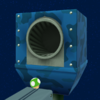 Chomp box |
Giant turrets that release Chomps. | Rightside Down Galaxy | Chompworks Galaxy |
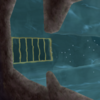 Current |
Currents that push Mario towards one direction. A rapid current in Stone Cyclone Galaxy brings him into a black hole. | Cosmic Cove Galaxy | Stone Cyclone Galaxy |
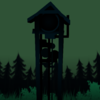 Dark |
Visible light reduction. Reduces visibility. | Boo Moon Galaxy | Flash Black Galaxy |
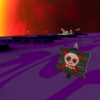 Dark matter |
A dangerous substance with a swirling pattern on it. Mario's body visually disintegrates when he makes contact with dark matter and he loses a life. | Cloudy Court Galaxy | Bowser Jr.'s Boom Bunker |
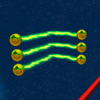 Electric rail |
Electrical barriers which shock Mario on contact. They emit either green or red electricity and move horizontally in some galaxies. Spiky Topmen can be damaged by spinning them into an electric rail. | Flip-Swap Galaxy | Grandmaster Galaxy |
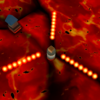 Fire Bar |
Rotating bars of fireballs that burn Mario on contact. | Bowser Jr.'s Fiery Flotilla | Bowser's Galaxy Generator |
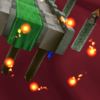 Fire Chain |
Spinning chain of fireballs that burn Mario on contact. | Bowser's Lava Lair | Slipsand Galaxy |
 Lava |
Molten rock. Direct contact burns Mario and makes him bounce into the air with his hands on his rear. It is emitted by volcanos and makes up the surface of some celestial bodies, such as suns. | Bowser Jr.'s Fiery Flotilla | Boss Blitz Galaxy |
Lava Geyser |
Columns of molten rock that rise from pools of lava. Direct contact burns Mario. Lava Geysers rise and fall in set intervals that can be timed. A rise is always proceeded by rapid bubbling on the lava's surface. In some areas, lava moves in waves. | Bowser's Lava Lair | Bowser's Galaxy Generator |
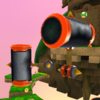 Ledge Hammer |
Giant black-and-orange hammers that can crush Mario or Luigi under their weight, defeating them instantly. Only one serves as a platform where there is a 1-Up Mushroom. | Clockwork Ruins Galaxy | |
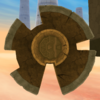 Millstone |
Large stone rocks that roll down slants. | Clockwork Ruins Galaxy | |
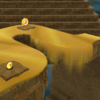 Moving sand |
Rapidly flowing sand. Mario can stand on it, but it will push him in the direction of its trajectory and potentially into hazards. | Slipsand Galaxy | |
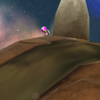 Mud |
Dirt mixed with water. Mario's movement speed and jump height is greatly reduced when he is in mud. This puts him at potential risk if dangerous enemies are nearby. | Boulder Bowl Galaxy | |
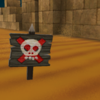 Quicksand |
Shifting sands. It functions identically to poison in that it will rapidly cause Mario to sink and he cannot escape its pull. Quicksand is usually denoted by signage that have skull-and-crossbones on them. | Slipsand Galaxy | |
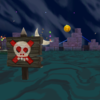 Sinking Swamp |
A bubbly, toxic sludge. Mario becomes trapped in the Sinking Swamp when he makes contact and will rapidly start to sink and lose a life. There is no way for the player to escape. | Boo Moon Galaxy | Mario Squared Galaxy |
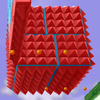 Spike |
Spikes damage Mario on contact. They generally appear attached to terrain. In some galaxies, spikes protract and retract into the floor in intervals that can be timed. | Flipsville Galaxy | Flip-Out Galaxy |
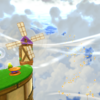 Wind |
Gusts that are often generated by fans or windmills. It can either help or hinder Mario. | Honeybloom Galaxy | Grandmaster Galaxy |
Bosses
Bosses are listed in the order that they are first encountered. They are organized into two categories: "main bosses" that are encountered in normal missions during the course of the game, and "secret bosses" only encountered through intramissionary Secret Star-missions and in World S, which becomes available after completing the narrative objective of rescuing Princess Peach. Excluding Bowser and Bowser Jr., who are each fought in a completely different fashion from the previous game, six of the game's bosses first appeared in the original Super Mario Galaxy.
| Name | Description | Missions |
|---|---|---|
| Main bosses | ||
 Peewee Piranha |
A Piranha Plant monster with a bulbous rear. It rushes at Mario when he is in its line of sight. Its rump is its weak point, but it is protected by an egg shell. Spinning into the shell breaks it. | Peewee Piranha's Temper Tantrum, Peewee Piranha's Speed Run |
 King Lakitu |
A giant Lakitu that can discharge lightning from his cloud. He throws Spiny Eggs at Mario and Yoshi. Firing the Spinies back at him is the only way to damage him. | Spiny Control |
 Digga-Leg |
A large construction robot equipped with Diggas. A glass casing under its head is its weak point: it can only be struck with the Spin Drill. It leaps to crush Mario with its feet after he lands a hit. | Digga-Leg's Planet, Digga-Leg's Daredevil Run |
 Gobblegut |
An earth dragon that tunnels through the ground with his jaws. Gobblegut's body is lined with vulnerable bulges that burst when spun into. Bursting every bulge defeats him. | Gobblegut's Aching Belly, Fiery Flotilla Speed Run |
 Mandibug Stack |
A Mandibug that carries its child on its back. Both can be defeated by performing a Ground-Pound. Defeating the child enrages the parent and makes it harder to strike. | The Puzzling Picture Block |
 Rollodillo |
A giant armadillo creature that rolls like Rock Mario and gallops. It rapidly charges towards Mario but tires out after three rolls. Its behind is unprotected and vulnerable to strikes. | Rock and Rollodillo |
 Bowser |
Mario's arch-nemesis: the fire-breathing king of Koopas. Bowser is unnaturally large from swallowing Grand Stars. He fights Mario on a planetoid he dwarfs in size and attacks with an onslaught of punches, shockwaves, and fire breath. Bowser summons a storm of meteorites with a roar. Ground-Pounding them into him is the only way to damage him. | Bowser's Big Lava Power Party, Breaking into Bowser's Castle, Bowser's Fortified Fortress |
 Sorbetti |
A malevolent snowman that frightens local Star Bunnies. It slowly rolls its head towards Mario and laughs with a successful hit. Its red nose is its weak point. Its movement quickens after being struck twice. | Sorbetti's Chilly Reception |
 Megahammer |
Bowser Jr.'s clown mech, equipped with Bill Blasters. It discharges electric shockwaves and has hammerheads in place of hands to crush Mario. Breaking the glass orbs on its body weakens it. | Bowser Jr.'s Mighty Megahammer, Megahammer's Daredevil Bash |
 Glamdozer |
A maternal Pupdozer. She climbs back-and-over the sides of a disc-shaped planet in pursuit of Mario. Her backside is protected by spiky armor, but her belly is soft and vulnerable. After being struck once, she starts spewing balls of melting goo. | Flip-Flopping in Flipsville |
 Squizzard |
A lizard-like antlion creature sitting at the center of a sinkhole. It tosses explosive knobby balls at Mario. After being struck twice, it erects two cannons to fire balls alongside it. It can only be damaged by fireballs launched by Fire Mario. | Squizzard's Sandy Sinkhole, Squizzard's Daredevil Run |
 Prince Pikante |
A wagon-riding Rocto that fires coconuts and enflamed rocks from his siphon. The wagon is equipped with three cannons that also shoot rocks in tandem with Prince Pikante. Spinning into the coconuts parries them back at him. | Prince Pikante's Peppery Mood |
 Boomsday Machine |
Bowser Jr.'s battle tank, piloted during his last stand. Its top is a tower equipped with Fire Bars and cannons that shoot homing electrical orbs. It is lined with vents that pull Mario towards it. Its weak point is Bowser Jr.'s glass cockpit. | Bowser Jr.'s Boomsday Machine, Boomsday Machine Daredevil Run |
 Whomp King |
The giant king of the Whomps, who stole a Power Star from the Bob-omb Buddies. When Mario is before him, he slams his body face first to crush him. His attack makes the ground quake: if Mario is on the ground when he evades the Whomp King's attack, the quake leaves him stunned in place for two seconds. Whimps are summoned during the fight. | Return of the Whomp King |
| Secret bosses | ||
 Bugaboom |
An enormous, winged Mandibug. It tries to bite Mario with its mandibles. Ground Pounding its abdomen damages it. Bugaboom takes flight after being struck once and starts releasing explosive droppings as it flies. | Bugaboom's Back |
 Gobblegut (Black) |
A fast-moving Gobblegut covered in flames. His bellyache bulges are his weak points. Once half of them burst, he moves faster and summons a rain of fireballs that leave pools of lava on the planet. | Snacktime for Gobblegut |
 Dino Piranha |
A Piranha Plant monster with a clubbed tail. It charges down Mario when he is in its line of sight. Spinning into its club slingshots it towards its head, damaging it. It charges more quickly after the first strike. | Throwback Throwdown ( |
 King Kaliente |
A giant Rocto that dwells in lava. He shoots coconuts and flaming rocks at Mario from his siphon. Spinning into a coconut smacks it back towards him and damages him. He starts to parry these attacks as the fight progresses. | Throwback Throwdown ( |
 Major Burrows |
A giant Undergrunt. He burrows towards Mario before bursting from the ground with swiping claws. Performing a Ground Pound on the earth when his head is exposed forces him to the surface and leaves him vulnerable to a spin attack. | Throwback Throwdown ( |
Bouldergeist |
A large ghost covered in rocks. It launches rocks and erects stone spikes to damage Mario. Attacking it with Bomb Boos destroys its armor and leaves it vulnerable to attack. During the second phase, it constructs giant hands to attack Mario and protect its body. | Throwback Throwdown ( |
 Dino Piranha (Black) |
A fast-moving Dino Piranha. Its clubbed tail periodically catches fire. The flames burn Mario and prevent him from spinning the club. After landing a hit, Fiery Dino Piranha becomes faster; leaves walls of fire in its wake; and spews balls of flame. Defeating this boss without being damaged requires well-timed precision. | Throwback Throwdown, Throwback Throwdown Speed Run |
Items and objects
Items
These are collectibles, pickups, health-restoring objects, and strikable objects that have consistent, specific contents.
| Name | Description | Name | Description |
|---|---|---|---|
 Power Stars |
Objects that are a source of energy for the Starship Mario. They are stolen by Bowser to create a galaxy of his own at the center of the universe. Collecting them completes missions and unlocks new levels. |  Green Stars |
Hidden, intermissionary Power Stars. Green Stars begin to appear in the galaxies after Mario[note 1] has accumulated 120 yellow Power Stars. Rather than appear in dedicated missions, they are hidden in previously completed ones. One emits a jingling sound when nearby, hinting at its location. Collecting one completes the mission. Grandmaster Galaxy is the only galaxy to not have any Green Stars. The final mission is unlocked once all 120 Green Stars have been collected. |
 Bronze Stars |
Embronzed Power Stars and Grand Stars. These replace the normal yellow Power Stars if the Cosmic Spirit was used to complete a level. A Bronze Star contributes to the player's accumulated star total, but they are not able to unlock Grandmaster Galaxy. To do so requires completing every single level without the Cosmic Spirit's aide. |  Silver Stars |
Small Stars that represent one-fifth of a Power Star and are contained in bubbles. Silver Stars squeal like Lumas and trail after Mario when he pops their bubbles. When five are collected, they merge to form a full Power Star. |
 Grand Stars |
Giant Power Stars of considerable energy. They are usually in the possession of bosses. Collecting them creates a portal through "space and time" that enables the Starship Mario to travel to new worlds. |  Comet Medals |
Large octagonal coins hidden in many galaxies. Collecting Comet Medals increases the odds of galaxies being orbited by Prankster Comets. Like Power Stars, coins, and Star Bits, Comet Medals are a permanent collectible that do not respawn after being accumulated. |
 Star Bits |
Colorful objects that are eaten by Lumas. They are found floating in space or raining from the sky. They are collected when Mario makes physical contact or when they are touched with the Star Pointer. The Star Pointer works like a reticle: pressing |
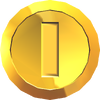 Coins |
Gold coins. Collecting one restores one bar to Mario's life meter. Collecting 100 during a mission and returning to Starship Mario gives Mario an extra life. If Mario loses a life during a mission, he loses all of the coins he collected within that specific mission. Hungry Lumas encountered in galaxies will transform into new planets and unlock a secret mission when fed a specified number of coins. |
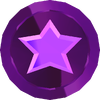 Purple Coins |
Coins that only appear in a galaxy when Purple Comets are in orbit. Missions involving Purple Coins are timed: collecting 100 Purple Coins pauses the timer and awards Mario a Power Star. |  ? Coins |
Big coins with inconsistent properties. Making contact with one has different results depending on the level, but exactly what is not specified until it is touched. One can make a power-up, mushroom, note, or another ? Coin appear. They do not contribute to Mario's coin count. |
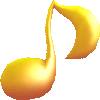 Notes |
Music notes which can appear when Mario touches a ? Coin or uses a Ground-Pound Switch. They appear in trails in the immediate vicinity and disappear after a few seconds. Collecting every note before they disappear awards Mario with a power-up, a mushroom, or a Power Star. |  Clocks |
Clocks that only appear in galaxies when Speedy Comets are in orbit. Collecting one adds 10 seconds to the player's time limit. |
 Green Shells |
Shells of green Koopa Troopas. Mario grabs one when he makes contact or spins near it. Shaking |
 Spin Drills |
A drill that can be carried by Mario. Shaking |
 1-Up Mushrooms |
Green mushrooms that give Mario an extra life when obtained. They are also sold at the Luma Shop. | Life Mushrooms |
Red mushrooms that doubles the amount of bars in Mario's life meter from three to six. If Mario loses three bars, they cannot be restored. The life meter returns to just three bars when Mario completes the mission, even if at full health. This mushroom is sold at the Luma Shop. |
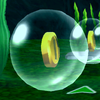 Bubbles |
Air bubbles appear underwater, often released by bubblers on the seafloor. Making contact with one refills Mario's air meter. They sometimes encapsulate coins. |  Keys |
Golden collectibles that grant access to new areas. Collecting one opens a corresponding glass domes. |
 Yellow Star Chips |
Star fragments that each represent one-fifth of a Launch Star. Collecting five causes them to merge into said Launch Star. |  Yoshi eggs |
The nested egg that holds Yoshi. Spinning into it releases Yoshi from the egg. Sometimes there are multiple Yoshi eggs in a galaxy, but they all disappear once Yoshi is released from one. If Mario is knocked-off of Yoshi, he will panic for a few seconds before being resealed into the egg and transported back to a nest. |
 Fruits |
Ground fruits eaten by Yoshi. Eating one releases a Star Bit. Eating ten gives Mario an extra life. When off of Yoshi, Mario can break a fruit by ground-pounding it. |  Giant fruits[10] |
Big fruits fastened tightly to the ground. Pulling on one with Yoshi brings it into his mouth and releases six Star Bits. It also causes a Launch Star to appear where it sat. |
Power-ups
Items that transform Mario's appearance and give him unique abilities. The Ice Flower and Red Star are the only power-ups from the first Super Mario Galaxy to not return.
| Power-up | Effect | Description |
|---|---|---|
 Cloud Flower |
 Cloud Mario |
The Cloud Flower transforms Mario into Cloud Mario, which enables him to walk on clouds that he would otherwise be too heavy to stand on. Cloud Mario can also create up to three cloud platforms by shaking |
 Rock Mushroom |
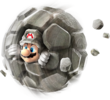 Rock Mario |
Touching the Rock Mushroom transforms Mario into Rock Mario. Shaking |
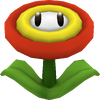 Fire Flower |
 Fire Mario |
The Fire Flower transforms Mario into Fire Mario for thirty seconds. Shaking |
 Bee Mushroom |
 Bee Mario |
Touching the Bee Mushroom transforms Mario into Bee Mario. Holding |
 Rainbow Star |
 Rainbow Mario |
Making contact with the Rainbow Star transforms Mario into Rainbow Mario for thirty seconds. He is invincible and can defeat enemies on contact. Running in this form makes Mario build speed and shortens the height of his jump. Attempting to collect a different power-up in this form will instead launch it up without collecting it. |
 Boo Mushroom |
 Boo Mario |
Mario is transformed into a Boo when he touches the Boo Mushroom. Shaking |
 Spring Mushroom |
 Spring Mario |
Making contact with the Spring Mushroom transforms Mario into Spring Mario. Mario continuously jumps in this form. Pressing |
Yoshi's fruits
There are fruits that function as power-ups for Yoshi. When consumed, he is temporarily transformed and gains new abilities.
| Fruit | Effect | Description |
|---|---|---|
Dash Pepper |
 Dash Yoshi |
Eating the Dash Pepper transforms Yoshi into Dash Yoshi for eight seconds. He bursts with speed and will only stop if he collides with an obstacle or the power-up wears off, but his direction can be controlled by tilting |
 Blimp Fruit |
 Blimp Yoshi |
The Blimp Fruit transforms Yoshi into Blimp Yoshi. He inflated like a balloon and trickles out air from his mouth, causing Blimp Yoshi to slowly rise. His trajectory can be controlled by tilting |
 Bulb Berry |
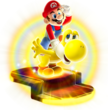 Bulb Yoshi |
The Bulb Berry causes Yoshi to illuminate light as Bulb Yoshi. The light exposes platforms that would otherwise be hidden and enables the player to use them. This form only lasts for only ten seconds, and the radius of Bulb Yoshi's light gradually depletes. The platforms disappear and can no longer be used once the ten seconds have passed. Eating another Bulb Berry before the time has ran out restores Bulb Yoshi's light and resets the timer. |
Objects
Objects are interactable elements of the environment that cannot be picked up or collected by Mario. For objects that primarily function as obstructions or hazards, see above.
| Name | Description | |
|---|---|---|
| Transportation objects | ||
 Cannon |
Cannons that launch Mario to distant areas. They are accessed like pipes. Entering one shifts the screen perspective to inside the cannon and turns to Star Cursor into a reticle symbol. Aiming the cursor on screen and pressing | |
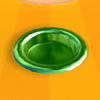 Divot |
Indentations in the ground for the Star Ball. Most launch it from one planetoid to another, but the final one of a galaxy always shatters it. This makes the content of the ball collectible. | |
 Floaty Fluff |
Short dandelions that are carried on gusts of wind. Mario grabs onto one by spinning. It slowly descends as it floats. It ascends briefly by shaking | |
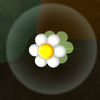 Flower |
White floating flowers. Using his tongue like a grapple, the flowers can be used to swing Yoshi to higher locations. | |
 Key Door |
Doors that open when Mario makes contact with a key. | |
 Launch Star |
Floating Stars near the surface of planets that launch Mario to distant areas when spun near. Some yellow Lumas transform into Launch Stars when freed by Mario. | |
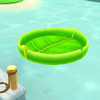 Leaf raft |
Boats owned by a green Pianta in Starshine Beach Galaxy. The leaf raft moves based on where Mario is standing in it. | |
 Pipe |
Pipes going through the ground that transport Mario to new areas. He enters one when | |
 Pull Star |
Floating Stars that are interacted with the Star Pointer. Moving the cursor over a Pull Star and holding | |
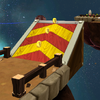 Ramp |
Ramps that launch Rock Mario from one platform to another while rolling. | |
 Sling Star |
Diminutive Launch Star-like objects that sling Mario towards a neighboring planet when spun near. | |
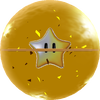 Star Ball |
Translucent orbs that contain Power Stars. Mario takes control of one when he jumps on top of it. The ball is steered by shifting | |
 Teleporter |
Teleporters are built into the ground of galaxies. Shaking | |
Tornado |
A vortex of desert winds that moves back-and-forth along a set path. Making contact will trap Mario within its gusts, but this does not damage him. Mario is propelled high into the air like a bamboo-copter if he tries to spin. | |
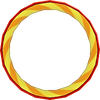 Underwater ring |
Dash rings found suspended in water. Swimming through one gives Mario a burst of speed. | |
Warp Pad |
Transport panels that transport Mario along a curved beacon of light from one part of the Starship Mario to another. | |
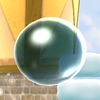 Water Ball |
Water Balls roll down slope in some galaxies and are fired by Water Shooters. Mario becomes trapped inside one when he touches it and is carried along with its trajectory. | |
| Blocks and containers | ||
 ? Block |
Floating blocks that contain a finite number of items (see above). One releases its content when Mario jumps underneath it. ? Blocks that contain coins and some that have Star Bits can be jumped under in rapid succession to release more than one. Most ? Blocks become empty blocks when their contents are exhausted. There are ? Blocks containing Star Bits that burst immediately when jumped under. Some are invisible and only become viewable once interacted with. | |
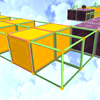 Beat Block |
Block platforms in Beat Block Galaxy that flash and disappear in correspondence with the level's music. It alternates between yellow blocks and green blocks, meaning only one set appears at a time. This limits the surfaces Mario can stand on and forces the player to keep moving, or else Mario will fall and lose a life. | |
 Block |
Blocks that contain nothing and cannot be broken. Coin Blocks and some ? Blocks become these when their contents are exhausted. | |
 Brick |
Blocks. Some are Coin Blocks that contain multiple coins like ? Blocks. Others are empty and fall apart when jumped under. | |
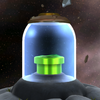 Cage |
Cloche domes that trap Lumas or contain objects of interest. They only open when Mario picks up a nearby key. | |
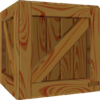 Crate |
Wooden boxes which rest on the ground. They contain items or Goombas. They release their contents when spun near or ground-pounded, which breaks the Crate. | |
 Flying ? Block |
Winged ? Blocks. The wings enable the block to move horizontally. Striking it once causes its wings to fall away, suspending it in place. | |
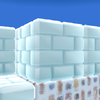 Ice block |
Large blocks made of snow. They can only be destroyed using fireballs from Fire Mario. | |
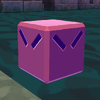 Pink block |
Block platforms. Standing on one generates more pink brocks that begin to snake over dangerous terrain. As one brick is created in the front, one disappears in the back. | |
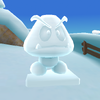 Snow sculpture |
Snowy sculptures in the forms of trees, Goombas, and Bowser. Fireballs from Fire Mario or a roll from Rock Mario can destroy them. Some contain Star Bits or Launch Stars. The Bowser ice sculptures obstruct pathways or contain Power Stars. | |
 Treasure chest |
Wooden treasure chests that contain items. One opens when a Green Shell is thrown at it. | |
| Strikable and spinnable objects | ||
Balloon |
Colorful balloons suspended in midair. When struck by Mario, one breaks and releases five Star Bits that automatically home-in on him for immediate collection. A balloon can also be broken by shooting a Star Bit at it via the Star Cursor. Doing so causes the Star Bits it contains to fall to the ground. | |
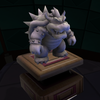 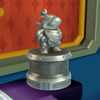 Bowser Statue |
Stone statues of Bowser that contain items. They are destroyed when they are struck by Bullet Bills. There are metal variants of Bowser Jr. that serve the same function. | |
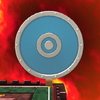 Bull's-eye[11] |
Large targets for the cannon. Launching Mario at the center of a bull's-eye awards him with an extra life. | |
 Chance Cube |
Dice carried by the Lumalees on Staship Mario. One Lumalee will transform into a Chance Cube in exchange for 30 Star Bits. The other will transform into five in exchange for 100 coins. Chance Cubes can give Mario a Star Bit, one 1-Up Mushroom, three 1-Up Mushrooms, or five 1-Up Mushrooms. | |
  Coconut / Watermelon |
Green fruits. Spinning into one launches them forward like a projectile. Some enemies and bosses fire coconuts themselves. Watermelons permanently replace coconuts once Mario accumulates 9999 Star Bits on one save file. | |
 Crystal |
Crystalline minerals which are broken when spun into. Most crystals are small, contain Star Bits, and are broken with a single spin. Others are large, contain Power Stars, and require three spins to be broken. Some crystals are opaque, obscuring their contents. Big variants also exist. | |
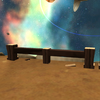 Fence |
Wooden barriers in Boulder Bowl Galaxy. They break when Mario strikes them in his Rock form. | |
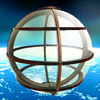 Glass case |
Glass spheres. They contain objects of interest, such as pipes, Star Bits, or Power Stars. They can be broken by Bullet Bills. | |
 Golden peg |
A bolt-like protrusion in the ground. Firing a Star Bit at one with the Star Pointer transforms it into a collectible coin. | |
 Lantern |
Lighting lanterns with fireballs solves puzzles and sometimes provides access to new areas. | |
 Lucky Cube |
Dice that can turn into different objects. Spinning one makes it roll. It will transform into an object based on which face of it is upward when it stops. Chance Cubes found in galaxies will either produce a 1-Up Mushroom, ten coins, a Star Bit, or a Goomba. | |
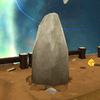 Obelisk |
Protruding rocks that contain items. One is destroyed when rolled into by Rock Mario. | |
 Rubbery bulb |
Bulbous plants similar to roly-poly toys. They can be used to break objects and defeat enemies. Spinning into one flings it forward and return with the same force exerted. Mario receives knockback if hit by the rebound. The plants rebound is halted if it collides with an enemy or object. They are comparable to the prickly plant enemies. | |
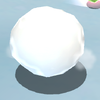 Snowball |
Big snowballs that accumulate mass when rolled on a snowy surface. Mario automatically pushes a snowball by walking into it, but he can push it farther by spinning. Snowballs can be pushed onto lava to make temporary snowy platforms, but the snowball loses mass and eventually can disappear this way. The Li'l Cinder enemy will automatically be defeated when it makes contact with a snowball. | |
 Star Piece Cluster Rock |
Giant crystalline structures that float in the set trajectory of Launch Stars. Colliding with one breaks it into seven collectible Star Bits. | |
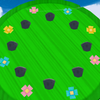 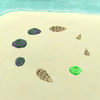 Stone circle / Shell circle |
A circle composed of eight rocks or shells embedded in the ground. Spinning inside the circle transforms the objects into Star Bits. | |
| Ground-poundable objects | ||
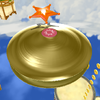 Cymbals[12] |
Ground-pounding the center of the top cymbal slams both pieces together and generates 25 Star Bits on their surface. | |
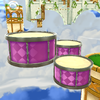 Drum |
Percussive trampolines in Cloudy Court Galaxy. The surface launches Mario high into the air. Ground-pounding the drums launch him even higher. | |
 Grate |
Metal panels embedded in the ground of Flipsville Galaxy. Ground-pounding through one allows Mario to access both sides of the planets in Flipsville and avoid enemies. They are necessary to defeat Pupdozers and the boss Glamdozer, which have spiky backs and soft penetrable bellies. | |
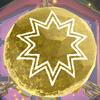 Meteorite |
Spherical space rocks that can be launched by ground-pounding their surfaces. They are used to break the locks on doors in certain galaxies, but they are most extensively used in boss fights against Bowser. | |
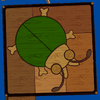 Picture block |
Types of puzzle pieces in Puzzle Plank Galaxy that shift their placement when ground-pounded into. They ultimately create a picture of a Mandibug and trigger the arrival of the Mandibug Stack boss. | |
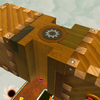 Puzzle piece[13] |
Wooden blocks in Puzzle Plank Galaxy. Ground-pounding specific spots on their surface changes their positioning or launches them into another wooden planetoid with an accompanying divot. | |
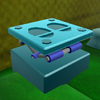 Springboard |
Blue springs that bounce Mario into the air when jumped on. | |
 Stone wheel |
Stone discs. Ground-pounding one breaks it and usually releases an item. Breaking one sometimes changes an element of the area it is in. In some galaxies, there are multiple stone wheels stacked on top of each other. | |
 Stump |
Tree stumps. Ground-pounding one either produces items or triggers events that enable level progression, like Ground-Pound Switches. | |
 Trampoline |
Orange springs that bounce Mario high in the air. Ground-pounding the surface of a trampoline launches Mario higher. | |
| Climbable objects | ||
 Banandelion |
Tall dandelions. Mario grabs onto one by spinning. Continuing to spin makes Mario ascend up the flower like a Sproutle Vine and flings him. | |
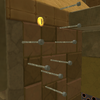 Bar |
Metal rods embedded in the sides of walls in Clockwork Ruins Galaxy. Mario can use them like swings to reach higher areas. | |
 Honey wall |
Hexagonal panels attached to the side of walls within levels. Mario can cling and crawl on them, but only while in his Bee form. | |
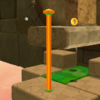 Pole |
Climbable poles. Mario clings to one by jumping onto it. He can ascend, descend, and change which face of the pole he is one by moving | |
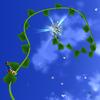 Sproutle Vine |
Twisting vines that sprout from the base of defeated Piranha Plants. Mario grabs and swings up one by spinning. Sproutle Vines enable Mario to travel from one planetoid to another. | |
 Swing |
Trapezes made out of vines and flowers. Mario grabs onto one automatically when he makes contact with it. Moving | |
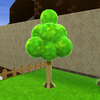 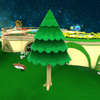 Tree |
Tall plants. Most function similarly to poles. Palm trees do not, but their fronds can be stood on like platforms. | |
| Switches | ||
 Blue switch |
Buttons with ! marks on them. In most contexts, ground-pounding a blue switch slows down time, but it causes the water on the surface of a planetoid in Cosmic Cove Galaxy to freeze over. | |
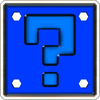 Flipswitch Panel |
Blue ? panels that turn into yellow ! ones when Mario steps on them. Stepping on all of the panels in a confined area turns the switches green and triggers access to a new area or the appearance of a Power Star. | |
Gravity switch |
Mounted arrow-shaped levers that shifts the gravitational pull from the floor to the ceiling. They only occur in portions of levels on a two-dimensional plane. | |
 Ground-Pound Switch |
Buttons that trigger a change in the surrounding environment when Mario ground-pounds into them. A Ground-Pound Switch is only useable once. There are wooden and stone variants that are destroyed when activated. The symbol on their button's face also appears on the abdomen of Mandibugs and the backs of Whomps. | |
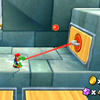 Handle[14] |
Handles attached the sides of drawer platforms. They can only be pulled by Yoshi's tongue, which makes the drawer accessible for a limited amount of time before it recedes. | |
 Lever Switch |
Levers that physically change the surrounding area, usually by granting Mario access to a new area by making a door or bridge appear. Mario uses one by spinning near it. | |
| Platforms | ||
 Airship |
Flying ships under Bowser's control. Enemies patrol the decks. Some are equipped with cannons that fire hazardous projectiles. | |
 Assembly Block |
Multi-shaped and multicolored block platforms. They initially float distantly in midair, but will immediately assemble into an established configuration if Mario approaches the intended space. They fall away if Mario moves away from the intended space, meaning the player does not have a permanent visual as to where the platforms are going to appear. | |
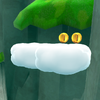 Cloud |
Floating platforms that Mario is normally too heavy to stand on. He can only do so in his Cloud or Bee forms. | |
 Disappearing platform[15] |
Yellow lifts. They have a set designation marked by a transparent outline of the platform. Reaching this spot causes it to flash blue and disappear. | |
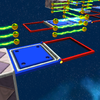 Flipping panel |
Platforms suspended in the air. A flipping panel consists of a hinged tile that is red on one side and blue on the other. Spinning causes the tile to flip its positioning. This affects all of the flipping panels in the level. This impacts the surfaces available for Mario to walk on and what obstacles need to be overcome. | |
 Flower |
Floating flower platforms that recede if Mario makes contact with them. He can only stand on them while in his Bee form. | |
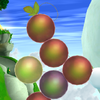 Giant grape[16] |
Large fruits that grow in Honeybloom Galaxy. They burst and fall apart if Mario makes contact with them. However, he can gently bounce off of their surfaces while in his Bee form. | |
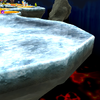 Ice |
Frozen surfaces. Ice reduces Mario's traction and causes him to slide, but spinning causes Mario to start skating. | |
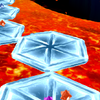 Ice Meteor |
Hexagonal platforms that appear in Shiverburn Galaxy. Falling ice creates these tiles on the surface of lava for a brief period of time before they melt away. The surface of these tiles function like normal ice. | |
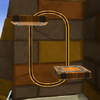 Lift |
Moving platforms. Their designs and environmental context for moving depends on where they are encountered. Rotating, wooden lifts attached to tracks appear in Throwback Galaxy. | |
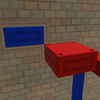 Red and blue blocks |
Block platforms embedded in the planets of Flip-Out Galaxy. They are similar to the flipping panels. Spinning causes red blocks to protrude from the wall and blue ones to recede, and vice versa with a subsequent spin. | |
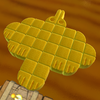 Sand Bird |
A moving bird-shaped platform composed of sand blocks. The blocks fall apart when they collide with cactuses or enemy projectiles. The blocks reform after a few seconds. | |
 Shrinking platform |
A checkerboard platform that disappears once Mario stands on it. | |
 Starshroom |
Mushroom-shaped starships with their own centers of gravity. They are piloted by the Toad Brigade. | |
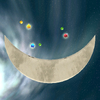 Teeter-totter moon |
The moon in Boo Moon Galaxy shifts back-and-forth like a seesaw based on where Mario stands on it. | |
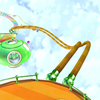 Track |
Rails that can roll the Star Ball without the player moving it. | |
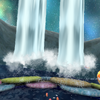 Waterfall |
Water overflowing the sides of elevated drops. In Cosmic Cove Galaxy, a pair of waterfalls can be frozen and wall jumped between. | |
| Other objects | ||
 Arrow Sign |
Signs that passively guide the player towards the intended focus of the mission they enter. In most instances, Mario can go off the intended path. | |
Beacon |
The source of energy for Starship Mario. It is found in the ship's internal engine room. | |
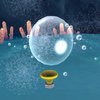 Bubbler |
Creates air bubbles. | |
 Checkpoint Flag |
Small flags that bear Bowser's insignia. Touching one replaces it with Mario's own emblem. If Mario is defeated during a mission he will respawn at the Checkpoint Flag rather than the beginning. | |
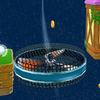 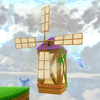 Fan / Windmill |
Produce constant gusts of wind. The currents can carry the cloud platforms made by Cloud Mario. | |
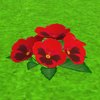 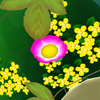 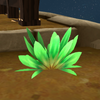 Flowers / Grass |
Plants that rustle when walked through. Some release Star Bits or Coins when disturbed. | |
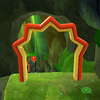 Gate |
A series of five gates that appear in galaxies involving Fluzzard. Gliding through all five gives the player a chance to collect the galaxy's Comet Medal. | |
 Rock |
Polygonal rocks. When Mario walks into a rock, he kicks it into the air. When it recollides with the ground, it breaks and releases a coin. | |
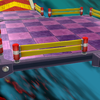 Rubber rail[17] |
Fences that bounce Rock Mario if he rolls towards them. | |
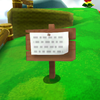 Signpost |
Posted signs that contain information on actions. One of them is a speaking character. | |
 Star Barrier |
Roadblocks on the world map. They disappear once the player has accumulated a specified number of Power Stars. | |
 Tip Network |
A talking television monitor that provides brief tutorials when prompted. It typically appears in difficult parts of a galaxy. | |
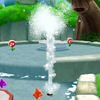 Water spout |
A device that expels water into the air in timed intervals. Mario is briefly carried into the air when he enters the stream. | |
Differences from Super Mario Galaxy
Gameplay
- While swimming underwater, Mario and Luigi can no longer spin rapidly.
- An exploit that allowed Mario to climb up slopes was patched.
- The game now saves automatically instead of the player having to manually save after every Power Star collected.
- If the player gets a Game Over, they return to the hub world, rather than being asked to save before going all the way back to the title screen.
- There are only three save files instead of six.
- Rosalina and Luma are new save file icons, while Luigi's can be used as an icon from the start.
- The player cannot copy save files like in the previous game.
- Bugaboom's boss fight now uses the Cloud Flower and springs, rather than the Bee Mushroom and swinging flowers.
- Coins are now a general collectible like Star Bits, rather than just being collected for a high score. After collecting a Power Star, coins collected are added to the coin collection, similar to Star Bits. A 1-Up is awarded for every 100 coins added to the collection.
- A 1-Up is no longer awarded for collecting 50 coins in a mission.
- Checkpoints are now marked by a Checkpoint Flag, rather than being invisible.
- The game now records the time the player has taken to beat the level.
- Luigi is now unlocked after defeating Bowser and unlocking World S, instead of the player playing through the game twice as Mario and Luigi.
- Cutscenes are now done in a storybook format, and the player has to press a button to progress dialogue.
- The game rewards a 1-Up upon collecting 100 Star Bits, rather than every 50.
- Collecting a Life Mushroom while having a full six hit points now rewards a 1-Up rather than nothing.
- When receiving a letter from Princess Peach, Mailtoad automatically gives the player 5 1-Ups, rather than asking if they want to accept it.
- Luigi no longer receives 20 1-Ups from Peach's letters, only receiving 5 like Mario.
- The credits are more interactive, with the player playing through various levels in the game, rather than having standard credits.
- The first-person camera is able to turn 360 degrees rather than 90 degrees left and right.
Levels
- In the first game, excluding green or red Power Stars, major galaxies had six Power Stars (three missions, two Prankster Comets with one of which being a Purple Comet mission, and a Hidden Star) while minor galaxies had one (the sole mission). In the sequel, these numbers were changed to give major galaxies three Power Stars and minor galaxies two Power Stars.
- The type of stars each galaxy has now varies, rather than having a constant amount of each type per galaxy. Major galaxies have either two missions and a Prankster Comet, two missions and a Hidden Star, or one mission, Prankster Comet, and Hidden Star each. Minor galaxies have either one mission and a Prankster Comet, one mission and a Hidden Star, or two missions (with the second mission being a challenge from either The Chimp or Jibberjay).
- Hungry Lumas that create planets in galaxies now require coins to be fed to them instead of Star Bits. However, Hungry Lumas that make galaxies still require Star Bits.
- Hungry Luma galaxies can be accessed via the World Map, just like the rest of the galaxies in their corresponding world, rather than using an alternate method to access it (a launch star outside of the dome).
- The galaxy icons on the World Map are much more detailed than in the first game, and some of them have more animated features, rather than being completely stationary models. Similar concepts have been used later in Super Mario 3D Land and Super Mario 3D World's stage icons.
Prankster Comets
- Prankster Comets are no longer categorized by type, simply leaving them as generic Prankster Comets.
- Boss galaxies now have Prankster Comets.
- During Speedy and timed Purple Coin missions, the clock now stops and disappears after the star appears, whereas in the original, the clock continued to run until the star was grabbed.
- Some Speedy Comet missions have clocks that must be grabbed to keep the timer going.
- Cosmic Comets and Fast-Foe Comets do not return, being replaced by Clone Comets and Double Time Comets respectively.
- The game now notifies a player when a Prankster Comet has appeared in a certain galaxy, rather than having to check themselves.
- The player can select any mission in the galaxy they want even if a Prankster Comet is in orbit. Because of this, Comet Tico and its ability to move Prankster Comets do not return.
- If the player loses a life during a Prankster Comet mission, the game does not ask the player if they want to retry the mission or return to the hub world, instead restarting the mission as normal.
Music
- While many soundtracks return from the first game, some returning soundtracks have been remixed to be more orchestrated rather than maintaining synthesized instruments. This includes:
- The theme of Bowser's Star Reactor and Bowser's Dark Matter Plant, used in Bowser's Lava Lair and Bowser's Gravity Gauntlet.
- The theme of Honeyhive Galaxy and Gold Leaf Galaxy used in Honeybloom Galaxy and Honeyhop Galaxy.
- The theme of Toy Time Galaxy used in Supermassive Galaxy.
- The mission selection theme.
- The level introduction theme.
- The Power Star and Grand Star fanfares.
- The jingle that plays when the player returns to the hub world.
- The theme of the Baron Brrr and Undergrunt Gunner boss battle, used in the King Lakitu and Mandibug Stack battles.
- When the star appears, the music changes to the soft "star appears" theme for the rest of the mission, unlike the original, which only played the theme after a boss was beaten.
- When Mailtoad has a letter from Peach, there is no sound that constantly plays when the player is near him.
- During the egg phase of Dino Piranha and Fiery Dino Piranha's boss fights, as well as the first phase of Major Burrow's boss fight, a new soundtrack (namely the theme of Boss Blitz Galaxy) is used during those sections instead of the originals.
- The Mandibug Stack mini-boss now has an actual theme playing (which shares the same with King Lakitu), rather than using the same theme as the level.
Aesthetic
- When Lumalee asks if the player wants to buy a 1-Up Mushroom or Life Mushroom, the dialogue boxes now show their names alongside their icon (like the Japanese version of the first game), rather than just their icon like in the English version of the first game.
- In the American version of the game, when getting an extra life, the text now shows "1UP" like the Japanese version instead of "1-UP" like the English version of the previous game. However, it's still "1-UP" in the European version.
- The "Game Over" text is now yellow instead of pink. The text is also slightly wider than in the previous game.
- The first Star that the player obtains is a Power Star rather than a Grand Star. It is also guarded by a boss, when there was no boss in the first game.
- The text saying "You got a Star/Grand Star" during the star collecting victory animation as well as the text saying "TOO BAD!" during when Mario/Luigi loses a life are slightly larger than in the first game.
- When the player returns to the Starship Mario after obtaining a Grand Star, the text box that appears afterwards says "You got a Grand Star", instead of "You got a Star".
- Similarly, when the player collects a Green Power Star, the text box says, "You got a Green Star", instead of "You got a hidden Star".
- Fiery Dino Piranha's egg now has visible heatwaves around it.
Staff
- Main article: List of Super Mario Galaxy 2 staff
General Producer
Producers
Director
Music
Development
The development of Super Mario Galaxy 2 started as soon as the first Super Mario Galaxy was released. Many of the ideas were based on those shown in the first game, which, for example, included moving or adding new stars in the levels. The project was initially called Super Mario Galaxy 1.5. The development of the new version of the game lasted a year; however, Miyamoto realized that the new game was beginning to overflow with new elements and ideas. Therefore, the team decided to create a real Super Mario Galaxy sequel rather than a new version of the original installment.[18] The development of the sequel then lasted two and half years.[19]
The game was revealed at E3 2009, along with New Super Mario Bros. Wii. Although the game was far along in development, it was held back to 2010 due to the release of New Super Mario Bros. Wii in November 2009.[20] According to Shigeru Miyamoto, 90% of the features in the game would be new, whereas the remaining 10% were already introduced or featured in the original Super Mario Galaxy. Shigeru Miyamoto noted, "Really what we ended up with is more than 90% of what you'll see in Galaxy 2 is brand new. I'd say closer to 95, maybe even 99%. One of the new things was the inclusion of Yoshi, and also the use of the drill to open up and drill through stages."[21] On the other hand, Miyamoto stated in an interview that he wanted to go with as little story as possible for Super Mario Galaxy 2.[22]
Some of the developers wanted to include characters from other Nintendo franchises, such as Pikmin or Donkey Kong. However, Miyamoto shot down the idea. [23]
CEO of Nintendo America Reggie Fils-Aime stated that Super Mario Galaxy 2 would be more challenging regarding its predecessor. It was hinted that the new game would implement a tool-assisted guide, similar to the Super Guide from New Super Mario Bros Wii. It was eventually confirmed, although it worked differently. Beginner players could use the Cosmic Guide mode (activated when encountering the Cosmic Spirit) or the Tip Network to learn moves and hints during gameplay. Japanese, European and Australian boxes came with a special DVD to help players to know basic and expert techniques of the game.
Reception
Upon its release, Super Mario Galaxy 2 was met with universal acclaim, and is one of the highest rated video games of all time on the aggregation sites Metacritic and GameRankings. EDGE magazine has given the game a perfect score of 10 out of 10, being the third Super Mario game so far to receive such rating (the others were Super Mario 64 and Super Mario Galaxy). Official Nintendo Magazine grants it a 97%, while Game Informer has given the game 9.25 out of 10. Nintendo Power gave it a 9.5 out of 10. IGN and Gamespot granted the game a perfect 10/10, as well as GamesRadar. Gamespot also gave the game the Best Platforming Award and the Best Wii Game Award of 2010. IGN named it the Best Wii Game of all time. Gametrailers has given a 9.7 from 10, while Famitsu a 37 out of 40. GamePro gave it four and a half stars, X-Play gave it a perfect five out of five stars, and 1UP.com an "A" rating.
| Reviews | |||
|---|---|---|---|
| Release | Reviewer, Publication | Score | Comment |
| Wii | Ryan Davis, Giant Bomb | 5/5 | "For all the meaningful changes and additions that have been made, this is still more Super Mario Galaxy--which is to say that it looks and sounds about as good as a game for the Wii ever has, with consistently inventive level design, and exceptionally responsive gameplay. We all like to give Nintendo a hard time for pandering to casual and nostalgic audiences, but when it brings its A-game, it's still able to deliver a fun, accessible game experience that's second to none." |
| Wii | Tom Mc Shea, GameSpot | 10/10 | "Super Mario Galaxy 2 is simply an outstanding game. It never rests on its laurels for a second, constantly presenting new objectives and mechanics to push you to never before seen places. Even the two-player mode offers new abilities and delights, making it even more fun to play with a friend by your side. Everything is so well designed and so entertaining that it's easy to get sucked into this world for hours. Super Mario Galaxy 2 is so phenomenal that it's difficult to imagine where Mario could possibly go in the future. But that's hardly your concern now. Mario proves that he is still the king of fun." |
| Wii | Oli Welsh, Eurogamer | 10/10 | "While the New Super Mario Bros. games have been content to remind us of Mario's roots, Super Mario Galaxy recast him in the role of fearless explorer, leaping into impossible realms, redefining what we could do in virtual space. Here, once again, was the Mario of Donkey Kong, of Super Mario Bros., of Super Mario 64. A simple extension of the Galaxy concept, Super Mario Galaxy 2 can't possibly have the same impact. But it does have the same spirit, throwing new ideas at you with gleeful and impulsive abandon, leaving you breathless, scrambling happily to keep up. You can't really complain about more of the same, when the same is the one thing it never is." |
| Aggregators | |||
| Compiler | Platform / Score | ||
| Metacritic | 97 | ||
| GameRankings | 97.35% | ||
Sales
Super Mario Galaxy 2 sold 143,000 copies on its first day of release in Japan and 340,000 copies in its first week.[24] In North America, the game sold 650,000 copies during the month of May 2010.[25] In the United Kingdom, it was the third best-selling game among multiplatform releases and the best-selling single platform release for the week ending June 26, 2010.[26] As of July 16, 2010, the game has sold 1 million copies within the USA[27] and 6.36 million copies worldwide as of April 2011.[28]
Awards
Super Mario Galaxy 2 was awarded Game of the Year by Nintendo Power[29] and named "Wii Game of the Year" by IGN,[30] GameSpot,[31] and 1UP[32] in 2010. In the March 2012 issue of Official Nintendo Magazine, the publication named Super Mario Galaxy 2 the "Greatest Nintendo Game Ever Made" ranking at #1 out of 100.[33] It was awarded Game of the Year and Best Game on Wii by Guinness Book of World Records Gamer's Edition 2011.[34]
Quotes
- Main article: List of Super Mario Galaxy 2 quotes
- "Oh, by the way, I found this 1-Up Mushroom a little while ago! Think you can use it?" - Banktoad
- "Super Mario Galaxy, Wahoo!" - Mario
- "First time in galaxy, always Comet medal somewhere. Look hard. Find!" - Whittle
Glitches
- Main article: List of Super Mario Galaxy 2 glitches
Infinite Fluttering
To perform this glitch, Mario should ride Yoshi and perform a Flutter Jump. When he is almost finished, the player should release ![]() and press
and press ![]() , then, release
, then, release ![]() and hold
and hold ![]() , repeating this to gain more height.[35][36] This was discovered by fans very shortly after the game's release. This glitch is known by many fans as "Infinite Fluttering," and has become the most well-known glitch in the game. Using this glitch, players can fight the final boss, Bowser, and also even clear the Perfect Run with Yoshi. It is also because of this glitch that many other glitches have also been found.
, repeating this to gain more height.[35][36] This was discovered by fans very shortly after the game's release. This glitch is known by many fans as "Infinite Fluttering," and has become the most well-known glitch in the game. Using this glitch, players can fight the final boss, Bowser, and also even clear the Perfect Run with Yoshi. It is also because of this glitch that many other glitches have also been found.
Red-Blue Panel jump glitch
In Flip-Swap Galaxy, Mario can use the upward momentum from a Red-Blue Panel flipping up to perform an extremely long, high jump. Mario must be on one of the non-flipping platforms in the galaxy. Then, he must run toward an empty space that a flipping platform flips to when Mario spins. Right before Mario runs into the empty space, he must spin to make the flipping platform flip to the empty space. Mario should fall onto the flipping platform while it is still rising. Finally, Mario must perform a Long Jump right before the platform stops moving. The timing for this is difficult, but if performed correctly, Mario does a "superjump" that covers huge distance and can be used as a shortcut.[35][37]
This can also happen if Cloud Mario jumps immediately after he forms a cloud.[35]
Pre-release and unused content
In the debut trailer from E3 2009 and the two Media Summit Trailers, there were several differences from the game's release.
- The starting planet in Boo Moon Galaxy was originally going to look similar to the Crystal Planet in Space Junk Galaxy from the first game.
- When a player used a Dash Pepper, the player did not glow or leave a glowing trail as in the final version.
- Good Egg Galaxy's background was used in Tall Trunk's Slide, and in Space Storm Galaxy's Topman's tower.
Gallery
- For this subject's image gallery, see Gallery:Super Mario Galaxy 2.
Music
- Main article: Super Mario Galaxy 2 Original Soundtrack
An official two-disc soundtrack was released exclusively to Club Nintendo members in Japan, which holds all seventy songs from the game. The game's official soundtrack is performed by the Mario Galaxy Orchestra.
Media
- For a complete list of media for this subject, see List of Super Mario Galaxy 2 media.
| File info 0:30 |
| File info 0:30 |
| File info 0:30 |
| File info 0:30 |
References to other games
- Super Mario Bros.: Supermassive Galaxy's music, which is itself a remix of Toy Time Galaxy's music from the first game, originated from this game's overworld theme. The first few notes of this music are played when switching between Mario and Luigi. Other music from this game returned from Super Mario Galaxy as well. In the Grandmaster Galaxy, there is a backdrop featuring elements and enemies, as well as Mario and Luigi in their 8-bit sprites from this game.
- Super Mario Bros. 3: Supermassive Galaxy is similar to Giant Land from this game, as the two are of massive size and feature giant versions of common items and enemies.
- Super Mario World: Yoshi, who first appeared in this game, is playable in Super Mario Galaxy 2, and the percussion sounds heard when riding on Yoshi are reused. In fact, when Mario first saves Yoshi, his speech is obviously based on his speech in this game. Additionally, this game's athletic theme returns as Hightail Falls Galaxy's music (as well as the music that plays during the mission for Starshine Beach Galaxy, "Purple Coin Beach Dash"), and the Ghost House theme returns as Haunty Halls Galaxy's and Boo Moon Galaxy's music. Also, the sound effect that is heard when a P Switch's effect is about to run out is used in the bonus areas of Super Mario Galaxy 2, and the sound effect heard when passing through a door in this game is used when opening a door in Boo Moon Galaxy. In Puzzle Plank Galaxy, the Rainbow Notes play the bonus game theme from Super Mario World.
- Super Mario 64: "Slider" from this game is used for Tall Trunk Galaxy and Rolling Coaster Galaxy. "Koopa's Road" theme is arranged once again, appearing in several Bowser-themed galaxies. Also, the Throwback Galaxy is a replica of Whomp's Fortress; its boss, the Whomp King, is fought there, and an arrangement of "Super Mario 64 Main Theme" plays there as well. Both games start with Peach sending a letter to Mario involving cake. Additionally, the "Inside the Castle Walls" theme can be heard when rescuing Peach and the final Grand Star in Super Mario Galaxy 2. The Rainbow Star theme is an arrangement of "Powerful Mario". Finally, Mario says, "Thank you so much for playing my game!" after the ending credits, just as he did in this game.
- Super Mario Sunshine: The Starshine Beach Galaxy is based on some elements from this game. The main mission of Twisty Trials Galaxy is a replica of the secret level found in Episode 4 of Ricco Harbor. The red and blue flipping platforms return, although they work differently. A few of Yoshi's sound clips are reused from this game. Piantas also return.
- New Super Mario Bros. Wii: The Checkpoint Flag returns from this game, and the Cosmic Guide and Tip Network are based on the Super Guide and hint movies from this game, respectively. Also, the world maps are based on the one from this game. In both games, Bowser is giant, and the final battle is divided in two different parts, the latter having a bigger Bowser. Fuzzies, the credits cake, and pink bricks take design elements from Fuzzies, the Koopalings' cake, and Ice Snake Blocks respectively in this game. The grassy cliffs and ground cross-section in the intro are based on their designs in Princess Peach's Kingdom and the grassy hills in the intro are based on this game's beach hills. Additionally, when players collect all the coins in a certain time limit that were accessed by a switch in Super Mario Galaxy 2, the audience claps in the same fashion they did in this game.
References in later media
- Donkey Kong Country Returns: The Flip-Out Galaxy's concept is back (but slighty changed) for the Switcheroo level.
- Super Mario 3D Land: Star Medals look similar to Comet Medals. In addition, the theme used on bonus planets is covered for Mystery Boxes. The blue and red flipping platforms return, but they are activated by jumping. The "beat blocks" return as well. Cosmic Clones return, but they look different. An early theme for the Boom Boom battle was the same theme played when fighting Peewee Piranha. Also, a lot of the voice clips, sounds, and enemy animations and behaviors are reused. World 7-5 is similar to Puzzle Plank Galaxy, and Special 5-1 is similar to Flip-Swap Galaxy. Also, a strange, ghostly entity can be seen in the woods near the Goal Pole of World 4-4, which bears resemblance to the three, strange, black Kodama-esque figures (Hellvalleyskytrees) seen in the background of Shiverburn Galaxy.
- Mario & Sonic at the London 2012 Olympic Games: The Sky Station Galaxy (under the name "Synchro Battle Galaxy") appears in the Dream Spacewalk event. Puzzle Plank Galaxy's music appears as an arrangement.
- Fortune Street: Starship Mario makes an appearance as one of the Super Mario franchise game boards.
- New Super Mario Bros. U: Balloon Baby Yoshi and Glowing Baby Yoshi's abilities resemble to those of Blimp Yoshi and Bulb Yoshi, respectively. Magmaarghs and Magmaws make reappearences as well.
- Super Mario 3D World: Green Stars make an appearance, replacing Star Medals from Super Mario 3D Land. Fizzlits return, although in a more square-shaped appearance. The final boss themes (and the Meowser defeated fanfare) have portions of the themes for Bowser's Galaxy Generator. Also, Grumblumps have a similar appearance to Rhomps. The Beat Block mechanic returns under the name "Beep Block", and the Beep Block stages return to the "beep-beep-beep-switch" rhythm as in this game with the same tempo as the Beat Block Galaxy theme as well. There is additionally a level called Boss Blitz, which is in reference to the Boss Blitz Galaxy.
- Super Smash Bros. for Nintendo 3DS / Wii U: Starship Mario appears in the background of the Mario Galaxy stage.
- Mario Kart 8 / Mario Kart 8 Deluxe: The giant dragon used for the Dragon Driftway racetrack has a similar design to Gobblegut, but with legs. In Deluxe, the battle course Dragon Palace has two statues of the same Gobblegut-like dragons. In the Booster Course Pass DLC, the Rock Cup's icon is a Rock Mushroom.
- Mario + Rabbids Kingdom Battle: Gobblegut is used as the base design for a weapon in this game.
- Super Smash Bros. Ultimate: Rock Mario, Lubba, and Starship Mario appear as spirits using their artwork from Super Mario Galaxy 2. Also, Melty Monster Galaxy's theme is added to the Super Mario franchise track list.
- The Super Mario Bros. Movie: Bowser is shrunken to a tiny size after his defeat, just like in the end credits of Super Mario Galaxy 2. A Dash Pepper icon appears on a bottle of hot sauce at Punch-Out Pizzeria on Foreman Spike's table.
- Super Mario Bros. Wonder: The Drill Mushroom powerup resembles and functions similarly to the Spin Drill item from Super Mario Galaxy 2. Mario's Spike Ball form under the effects of the Wonder Flower functions similar to Rock Mario.
Names in other languages
| Language | Name | Meaning | Notes |
|---|---|---|---|
| Japanese | スーパーマリオギャラクシー2[?] Sūpā Mario Gyarakushī Tsū |
Super Mario Galaxy 2 | |
| Chinese | 超級瑪利歐銀河2[?] Chāojí Mǎlìōu Yínhé Èr |
Super Mario Galaxy 2 | |
| German | Super Mario Galaxy 2[?] | - | |
| Korean | 슈퍼 마리오 Wii 2 갤럭시 어드벤처 투게더[?] Syupeo Mario Wii 2 Gaelleoksi Eodeubencheo Tugedeo |
Super Mario Wii 2: Galaxy Adventure Together | |
| Spanish | Super Mario Galaxy 2[?] | - |
Trivia
- The save data description in English is "Launch into a new adventure!"
- The Japanese equivalent is 「銀河を舞台にまたまた大冒険!」
- Even though Super Mario Galaxy 2 is not featured in the compilation title Super Mario 3D All-Stars, an abridged version of the theme for when Mario or Luigi grabs a Power Star is recycled for the game's title screen.
Notes and references
Notes
References
- ^ Super Mario Galaxy 2 para Wii. LevelUp.
- ^ [1]. Amazon México.
- ^ Kazuya Sakai (Ambit), kikai, Akinori Sao, Junko Fukuda, Kunio Takayama, and Ko Nakahara (Shogakukan) (ed.). Encyclopedia Super Mario Bros. Milwaulkie: Dark Horse Books, 2018. ISBN: 978-4-09-106569-8
- ^ Mario Portal (Japanese). Nintendo. Retrieved August 19, 2018.
- ^ Michael `Jasper` Ashworth. "How Spherical Planets Bent the Rules in Super Mario Galaxy". YouTube. Published 29 Sep 2020. Accessed 27 Feb 2021.
- ^ Yoshiaki Koizumi. "Super Mario Galaxy: The Journey from Garden to Galaxy". Montreal International Games Summit (archived), Jan. 2007. Recorded by Eric St-Cyr. Compiled by Hover. YouTube. Published 24 Sep 2016. Accessed 27 Feb 2021.
- ^ Satoru Iwata (trans. Nintendo Treehouse). "Wii interviews: Super Mario Galaxy 2". Iwata Asks. Published 2010. Accessed 12 Apr 2021.
- ^ Chris Kohler. "Q&A: Nintendo's Shigeru Miyamoto on Mario, Zelda, Project Natal and More". Wired. Published 12 Jun 2009. Accessed 01 May 2021.
- ^ Catherine Browne. Super Mario Galaxy 2: Prima Official Game Guide. Roseville: Random House Inc, 2010. ISBN: 978-0-30746-907-6.
- ^ Super Mario Galaxy 2: Prima Official Game Guide, p.45.
- ^ Super Mario Galaxy 2: Prima Official Game Guide, p.206.
- ^ Super Mario Galaxy 2: Prima Official Game Guide, p.118.
- ^ Super Mario Galaxy 2: Prima Official Game Guide, p.74.
- ^ Super Mario Galaxy 2: Prima Official Game Guide, p.46.
- ^ Super Mario Galaxy 2: Prima Official Game Guide, p.51, 52.
- ^ Super Mario Galaxy 2: Prima Official Game Guide, p. 102.
- ^ Super Mario Galaxy 2: Prima Official Game Guide, p.215.
- ^ Nintendo Everything >> Blog Archive >> At one point, Super Mario Galaxy 2 was Super Mario Galaxy 1.5 "As soon as the project was over, we started making something that we might call version 1.5. We did things like moving or adding stars to levels that were already available... we realized that there were too many things to fit into a version 1.5. That made us realize we should start from scratch and make Super Mario Galaxy 2." - Miyamoto during Iwata Asks: Super Mario Galaxy 2 interview
- ^ Iwata Asks: Super Mario Galaxy 2 - Volume 2
- ^ https://web.archive.org/web/20090612002157/http://wii.ign.com/articles/989/989996p1.html
- ^ E3: Miyamoto: Galaxy 2 Is As Big As The Original
- ^ Shigeru Miyamoto Interview at Wired.com
- ^ Super Mario Galaxy 2 Could Have Featured Donkey Kong and Pikmin Cameos, But Miyamoto Said "No"
- ^ https://web.archive.org/web/20100610070540/http://www.gamasutra.com:80/view/news/28821/Super_Mario_Galaxy_2_Dominates_Charts_In_Japanese_Debut.php]
- ^ https://www.gamespot.com/articles/may-sales-rebound-led-by-red-dead-redemption-analyst/1100-6267067/
- ^ https://web.archive.org/web/20100712221657/http://www.gamasutra.com/view/news/29149/Lego_Harry_Potter_Years_14_Ends_Red_Deads_FiveWeek_Run_In_UK.php
- ^ https://web.archive.org/web/20100730014304/http://uk.gamespot.com/news/6269359.html
- ^ https://www.nintendo.co.jp/ir/pdf/2011/110426e.pdf#page=5
- ^ https://www.retromags.com/magazines/usa/nintendo-power/nintendo-power-issue-265/
- ^ https://web.archive.org/web/20120314091306/http://uk.bestof.ign.com/2010/wii/best-wii-game-of-the-year.html
- ^ https://web.archive.org/web/20101228175310/http://uk.gamespot.com/best-of-2010/platform-awards/index.html?page=4
- ^ https://archive.is/20130101174447/http://www.1up.com/features/1up-2010-game-year-awards
- ^ https://web.archive.org/web/20120309185253/http://www.officialnintendomagazine.co.uk/36238/super-mario-galaxy-2-is-onms-best-nintendo-game-of-all-time/
- ^ Glenday, C. 2011. Guinness Book of World Records Gamer's Edition 2011, pages 12, 26.
- ^ a b c A+Start (Mar 20, 2015)Super Mario Galaxy 2 Glitches - Son Of A Glitch - Episode 40 YouTube. Retrieved March 6, 2017.
- ^ Pottoww (Jul 5, 2014) Super Mario Galaxy 2 Glitch - How to Infinite Flutter using Yoshi (Explanation) YouTube. Retrieved March 6, 2017.
- ^ packattack04082 (Jun 20, 2010) Super Mario Galaxy 2 - Flip-Swap Galaxy - Think Before You Shake - 30.11 YouTube. Retrieved March 6, 2017
External links
- Mario Portal Game Archive (EN) (archive)
- Mario Portal Game Archive (JP)
- Official North American Website
- Official Mexican Website
- Official Japanese Website
- Official Oceanian Website
- Official European Website
- Official Chinese Website (Taiwan)
- Official Chinese Website (Hong Kong)
- Wii's channel on YouTube - Super Mario Galaxy 2
- North American manual (EN)
- North American manual (FR)
- North American manual (ES)
